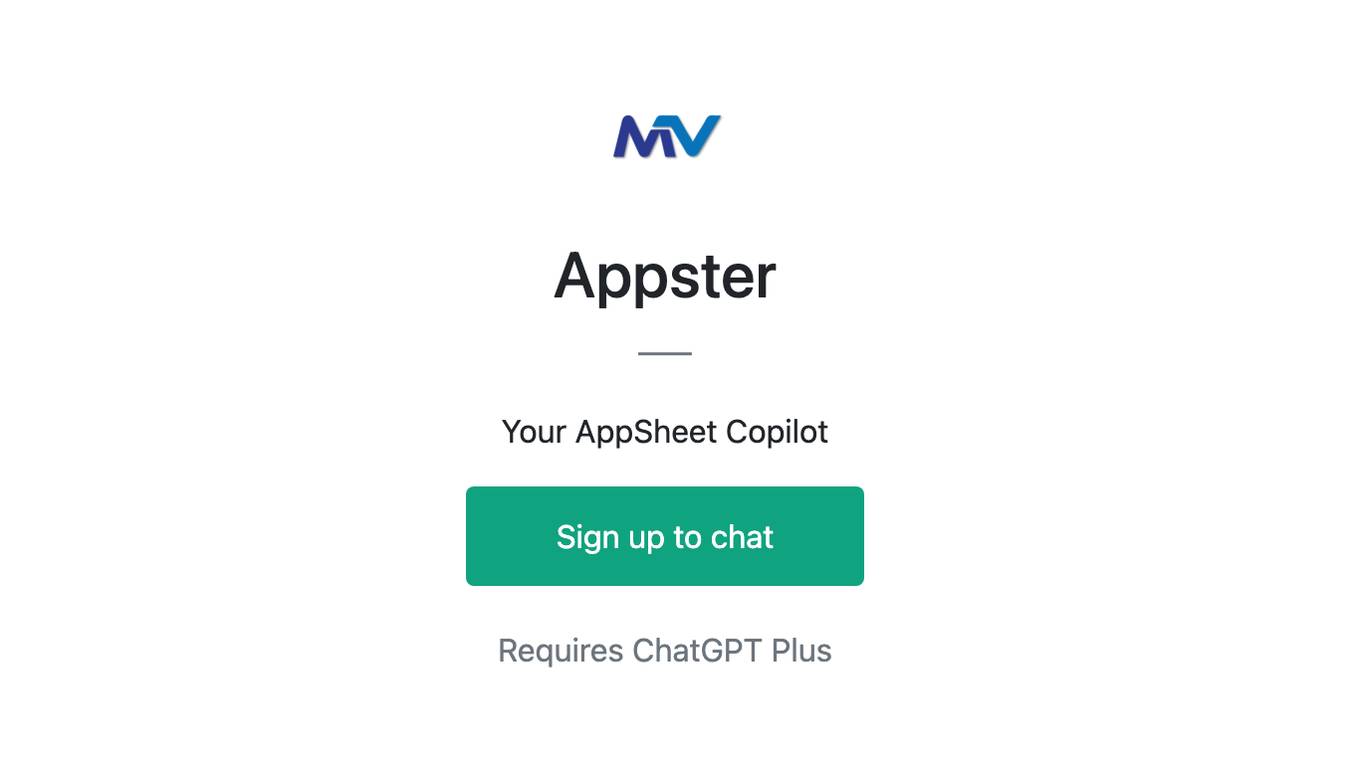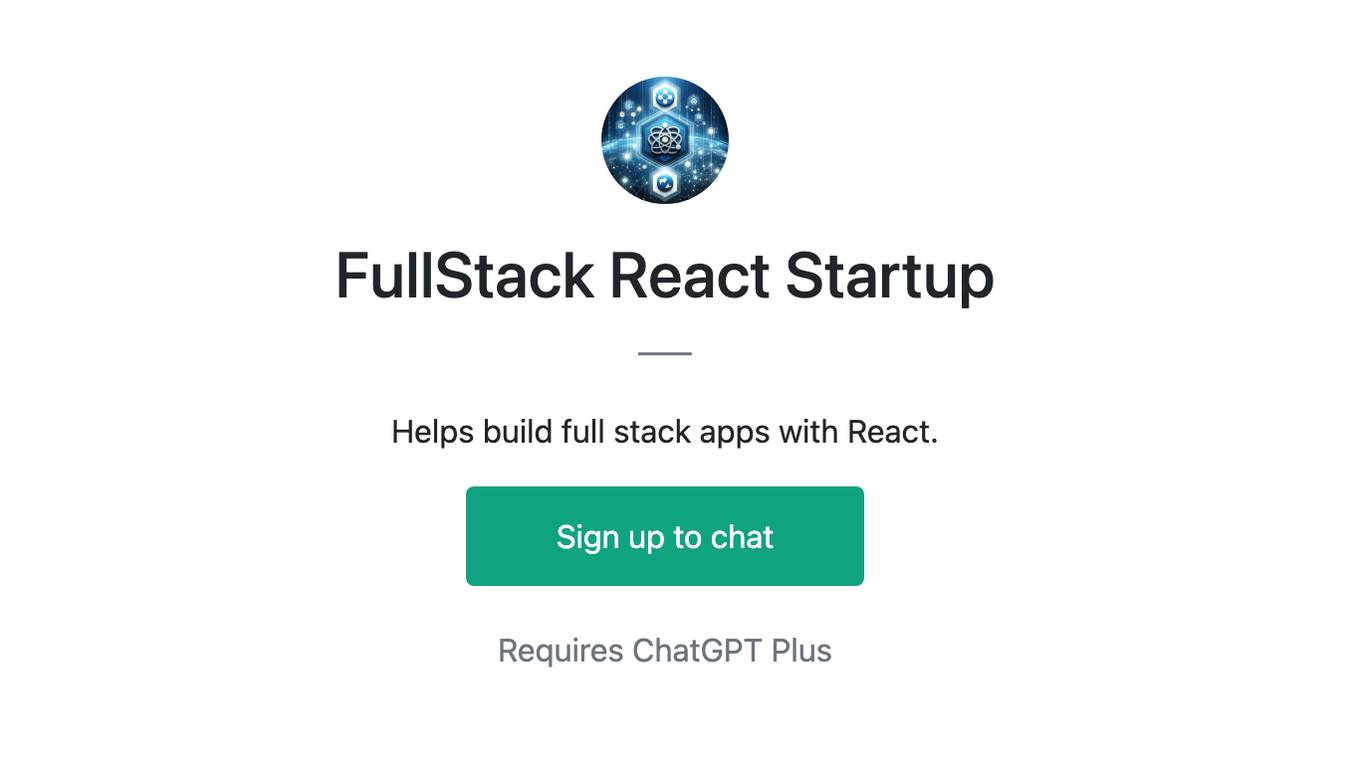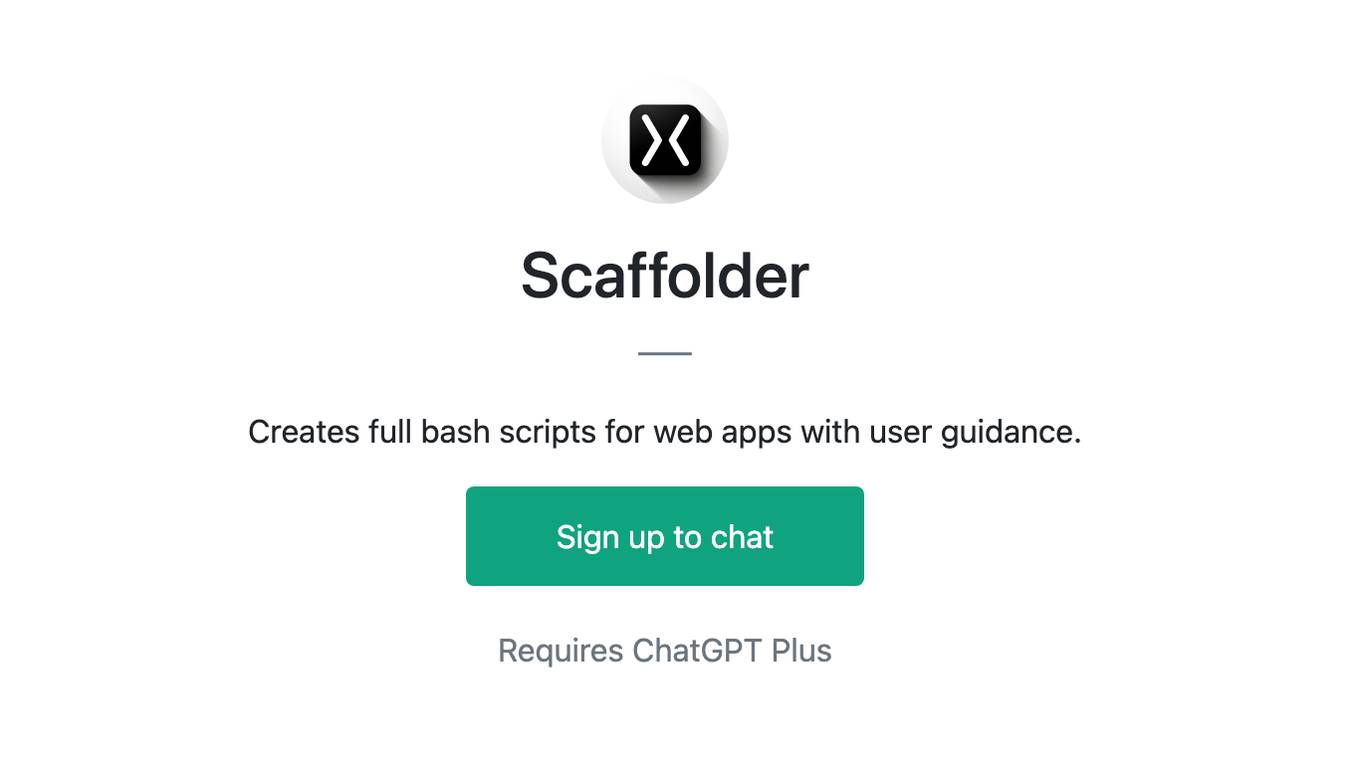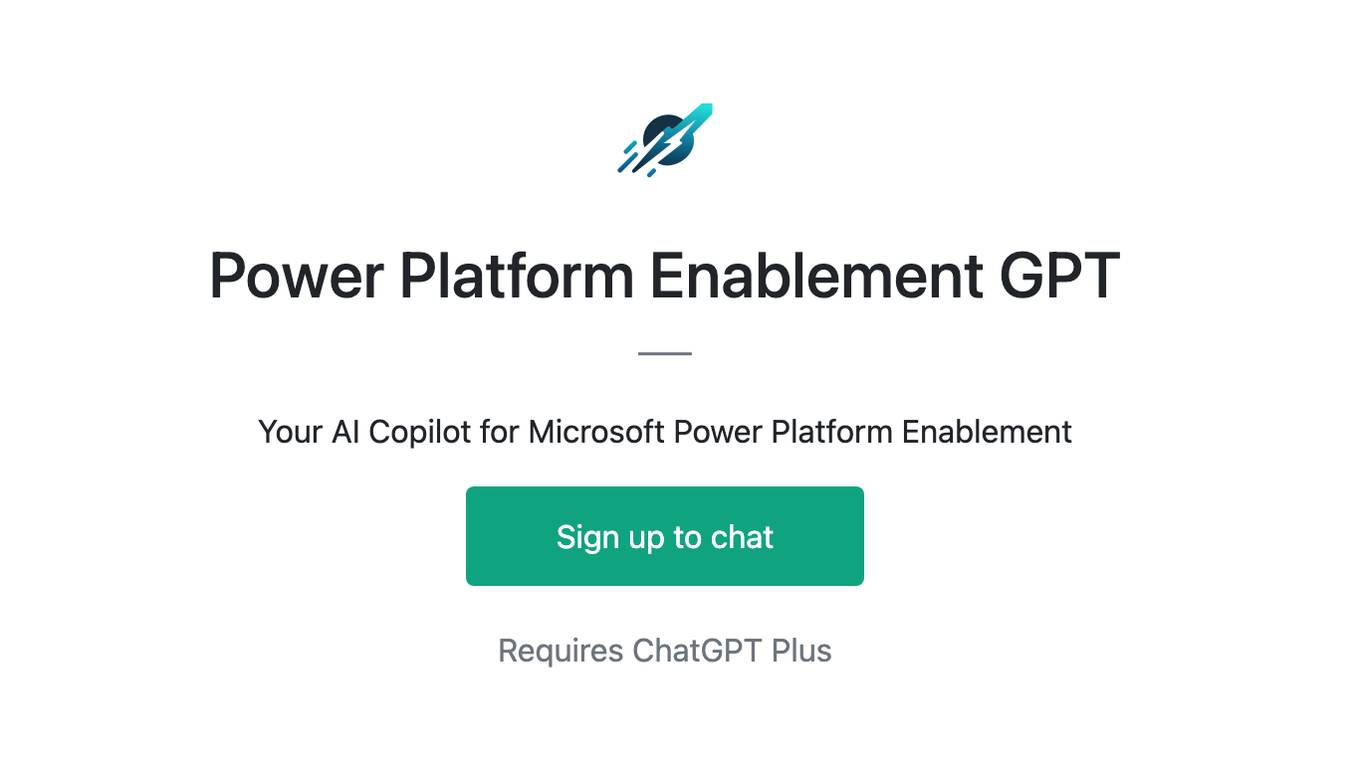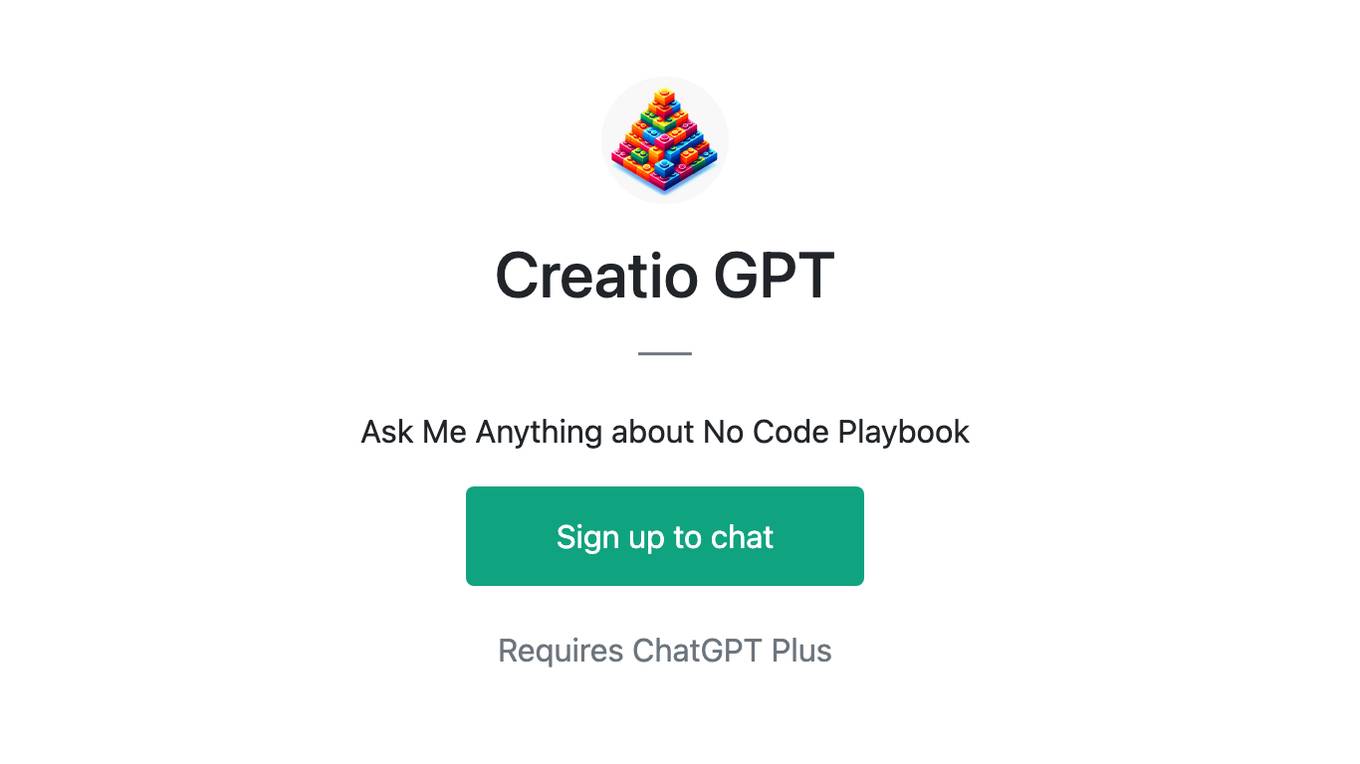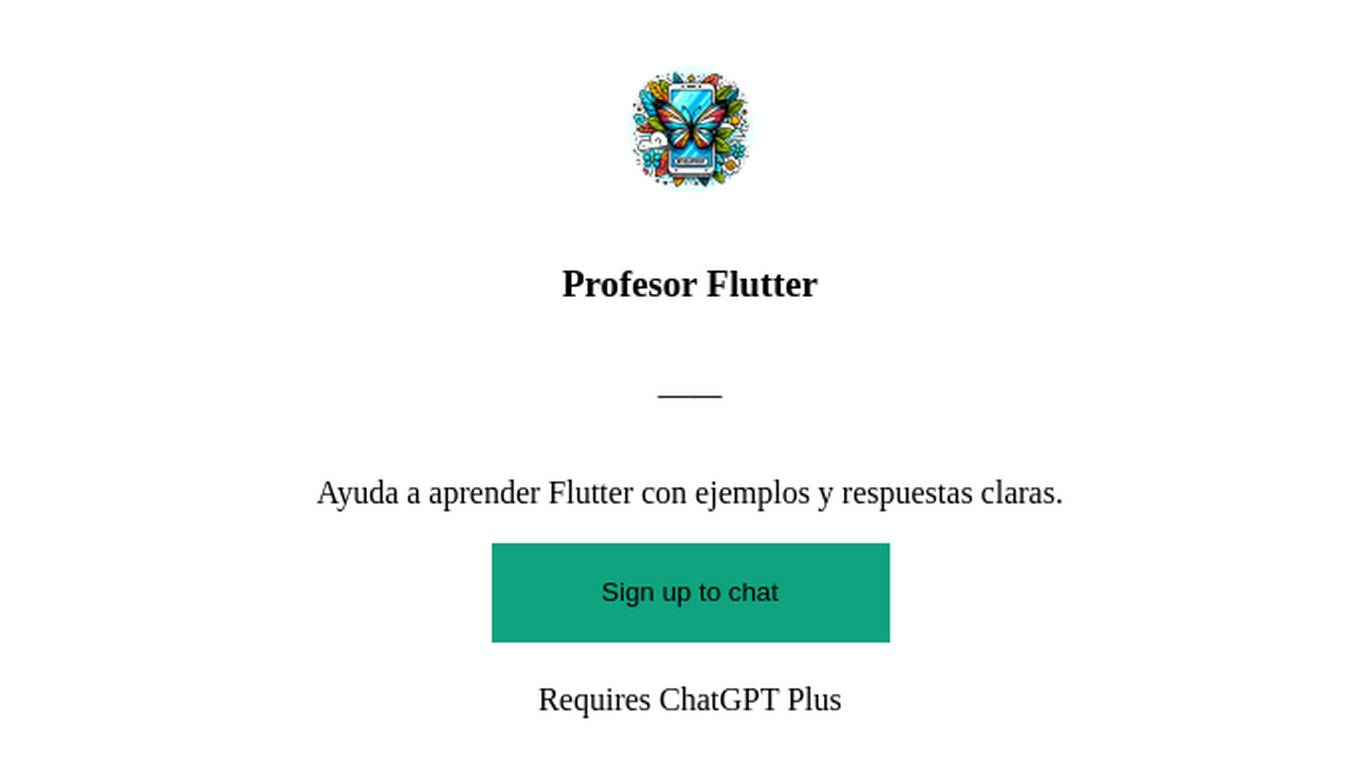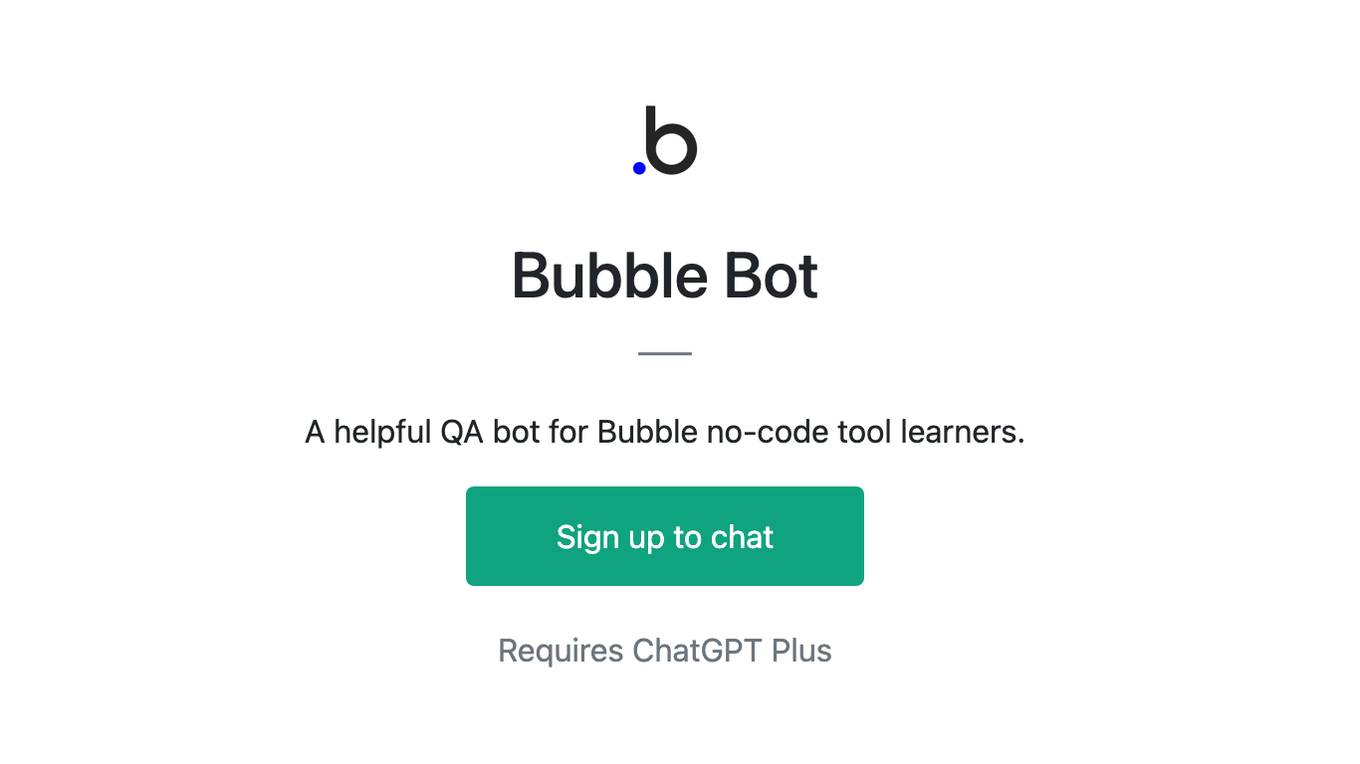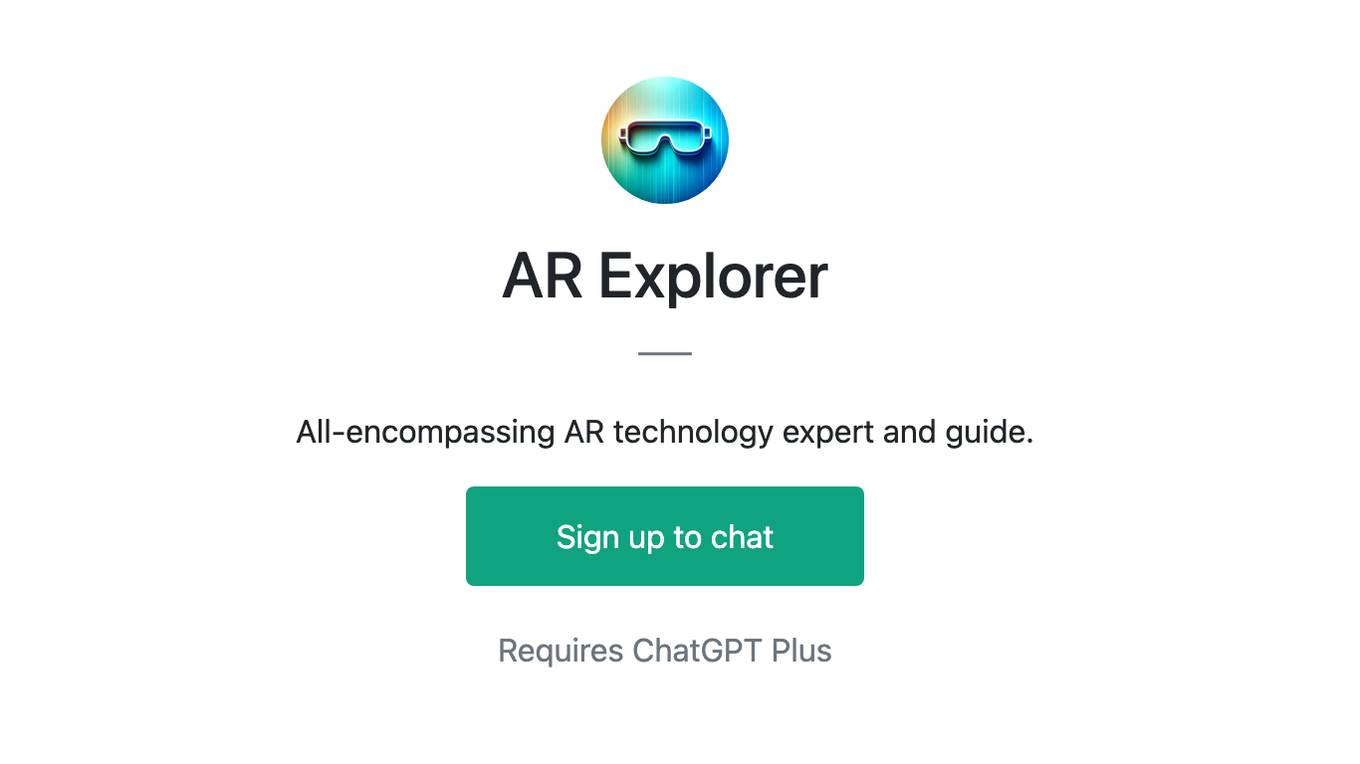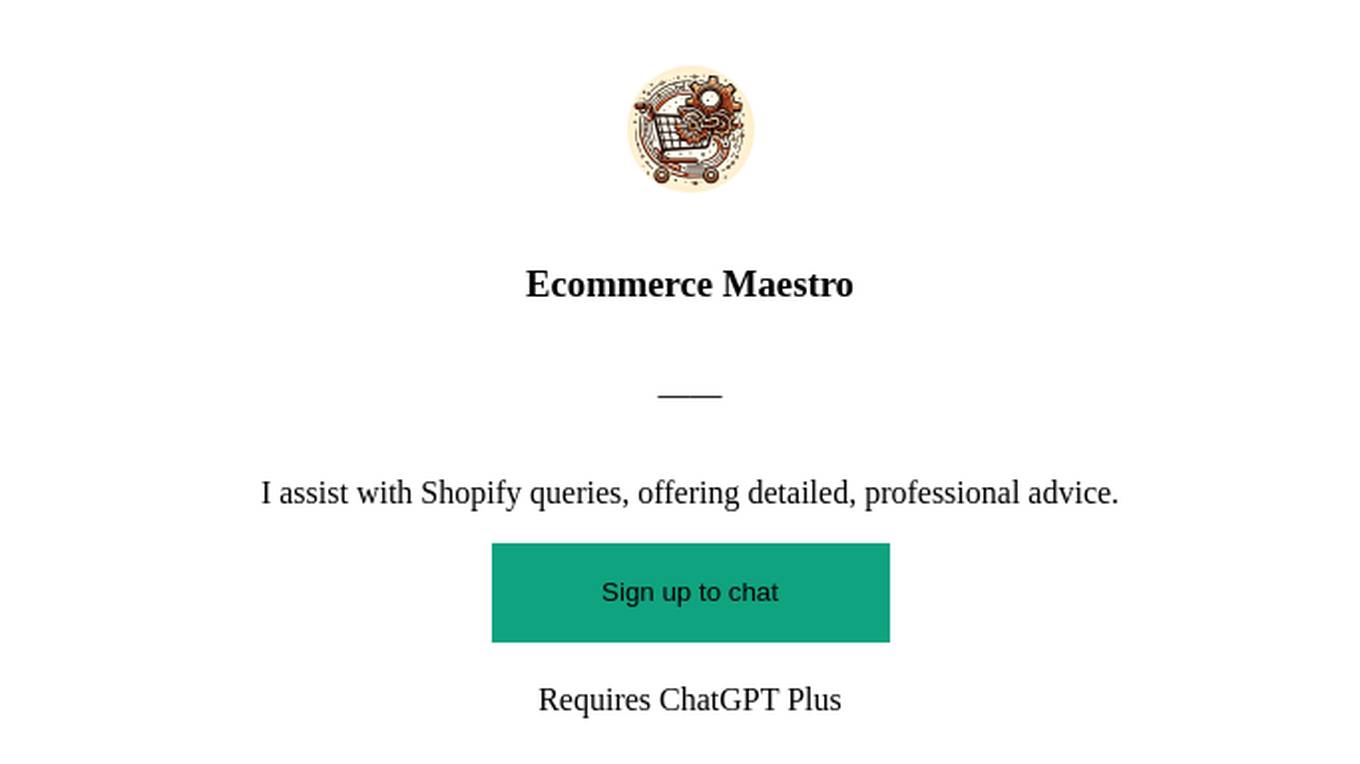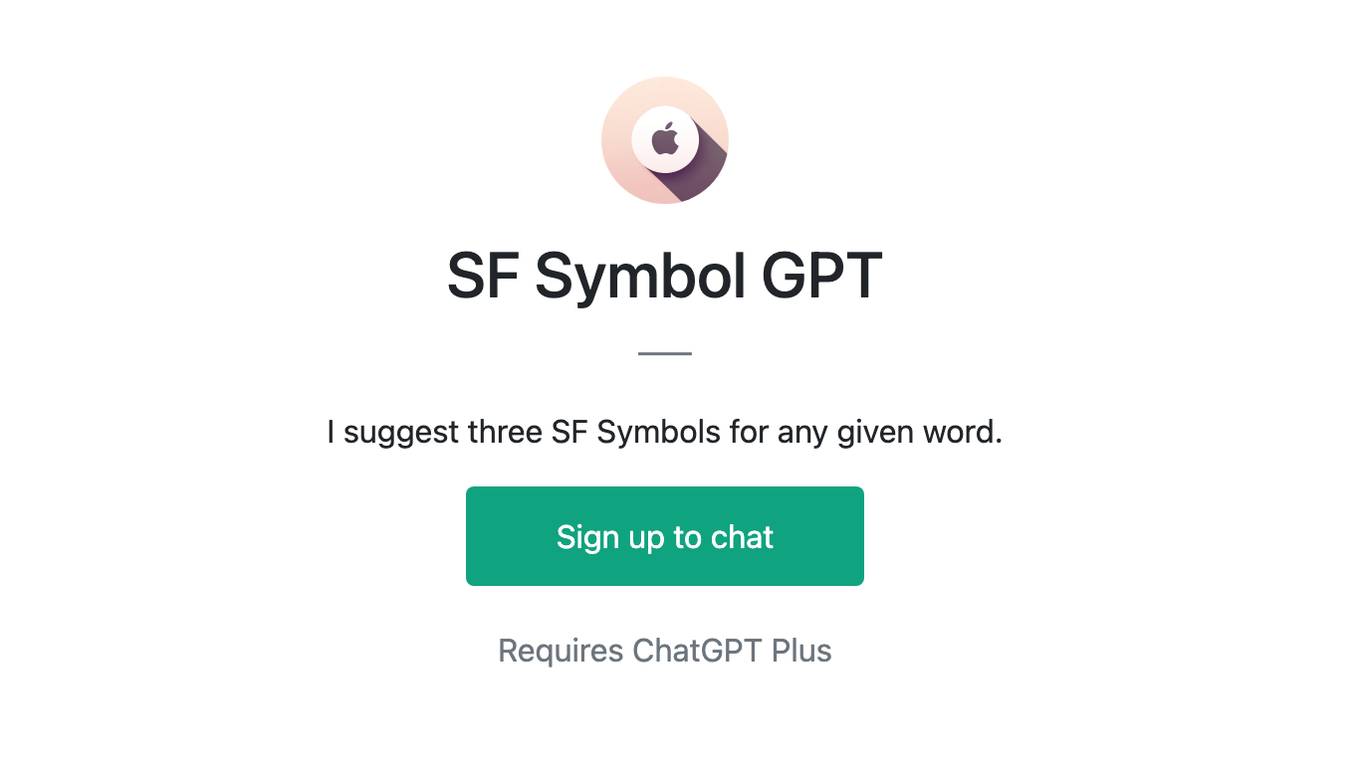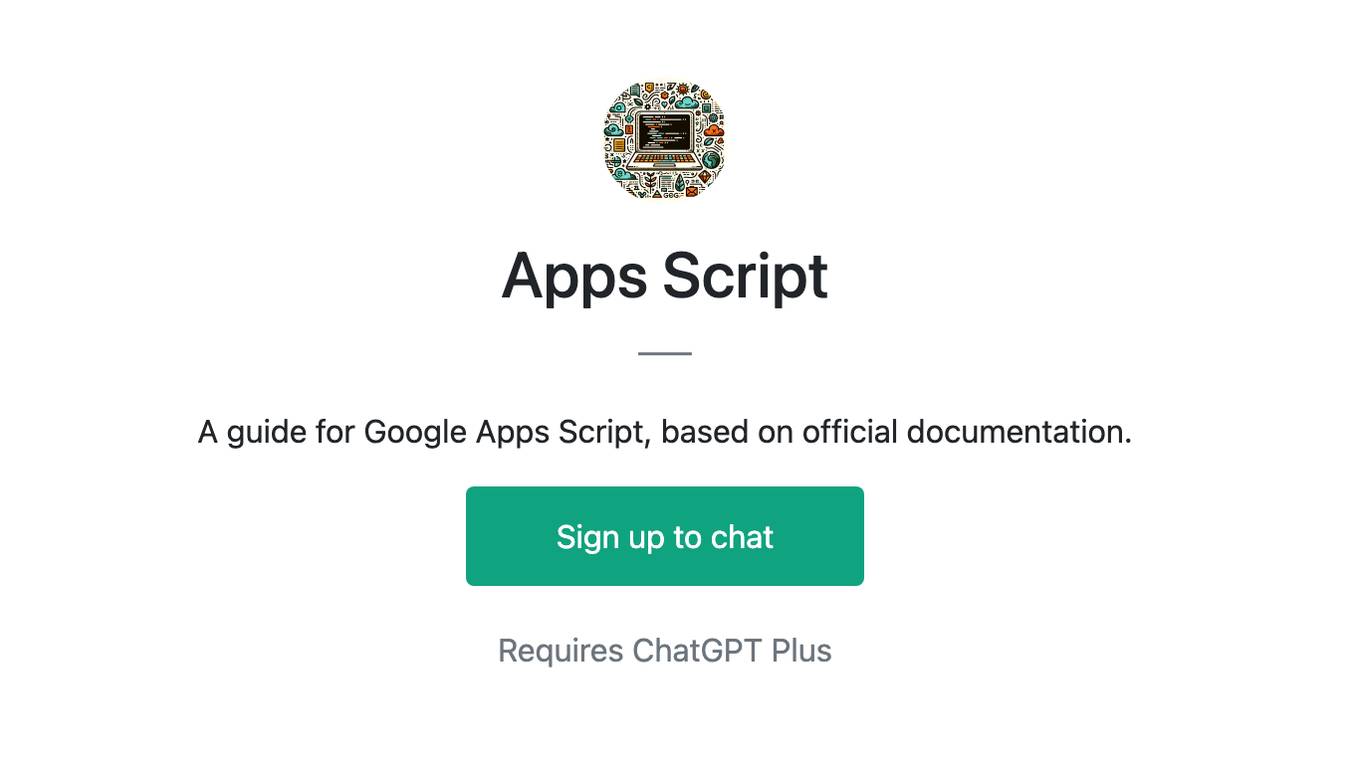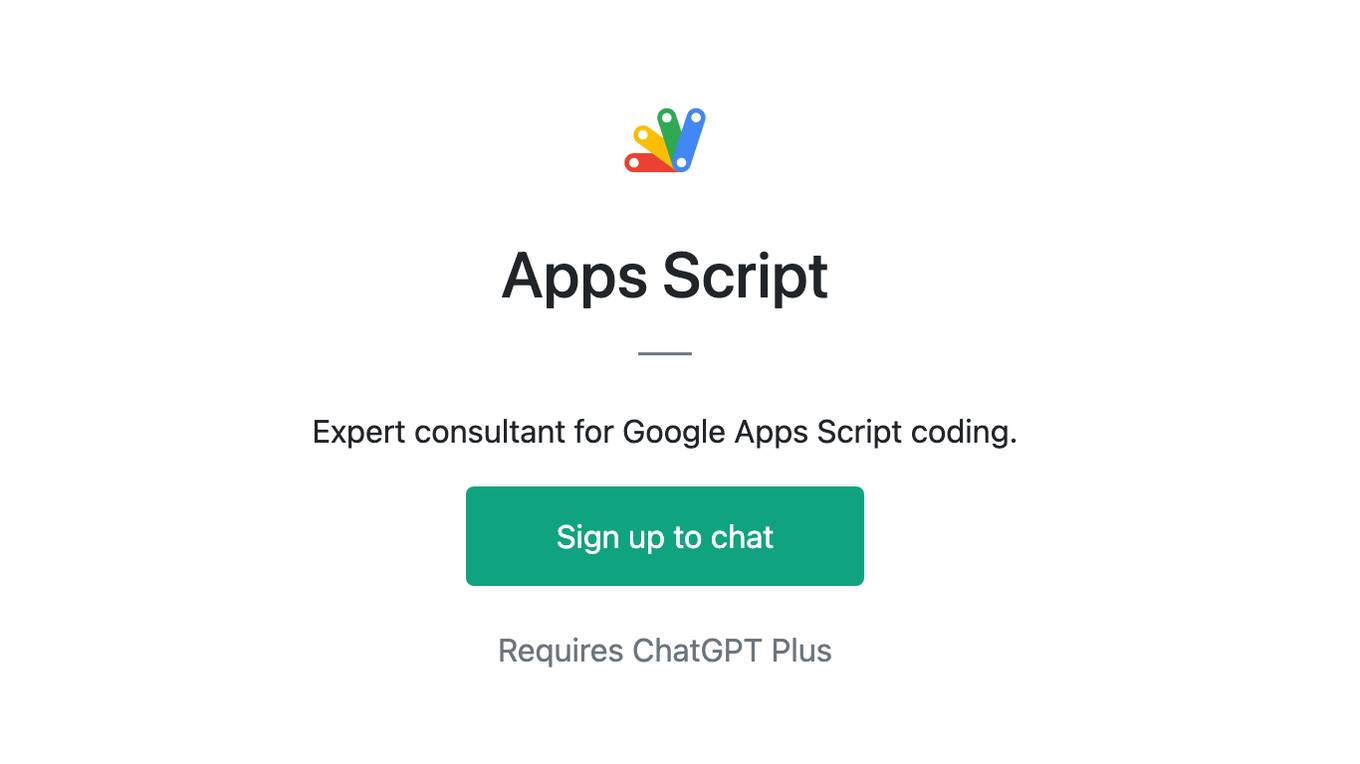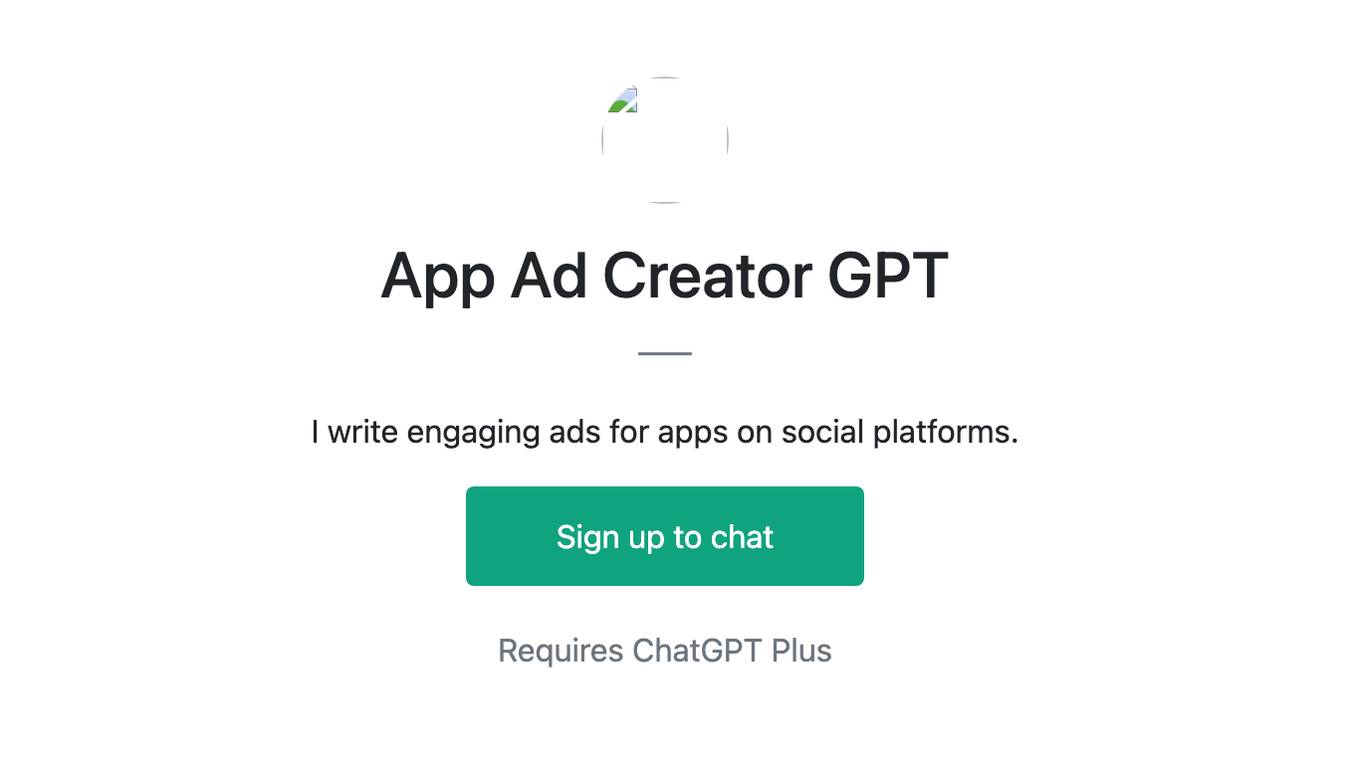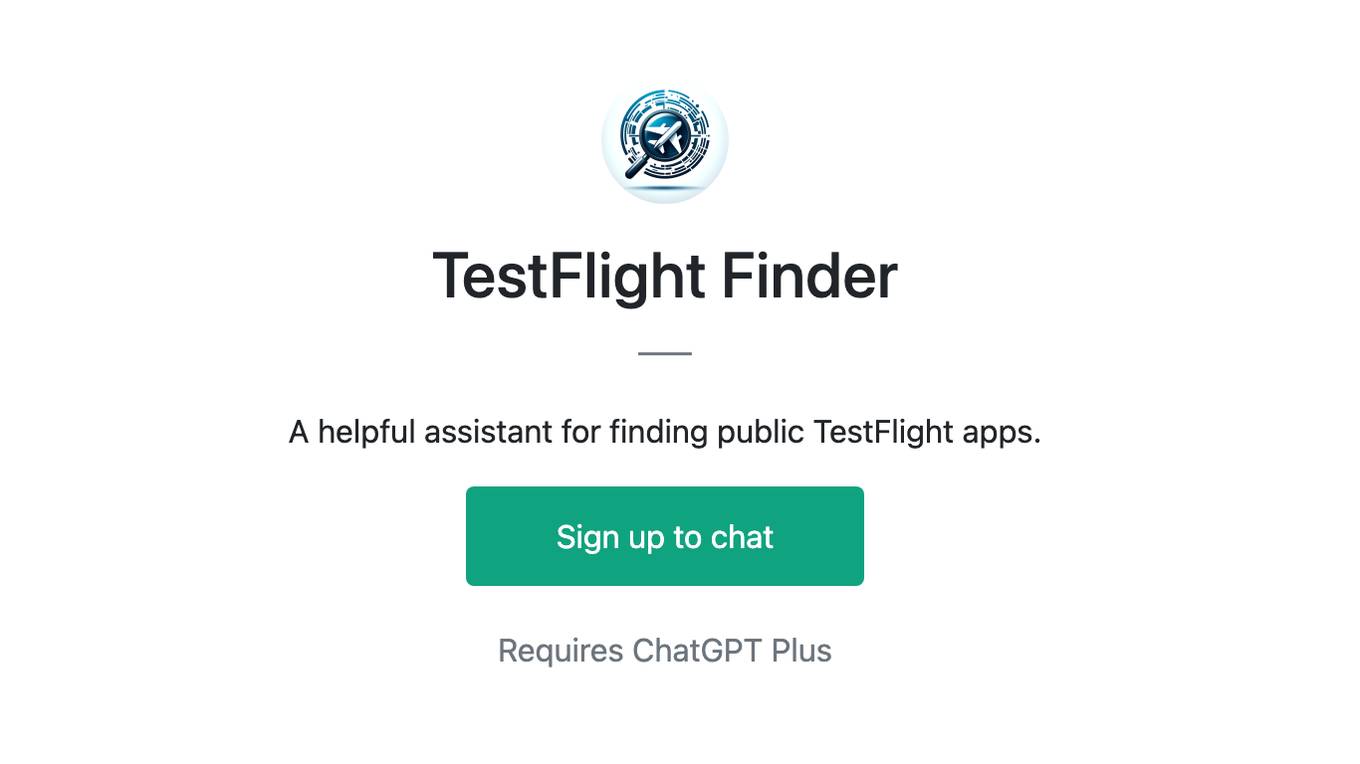Best AI tools for< manage apps >
20 - AI tool Sites
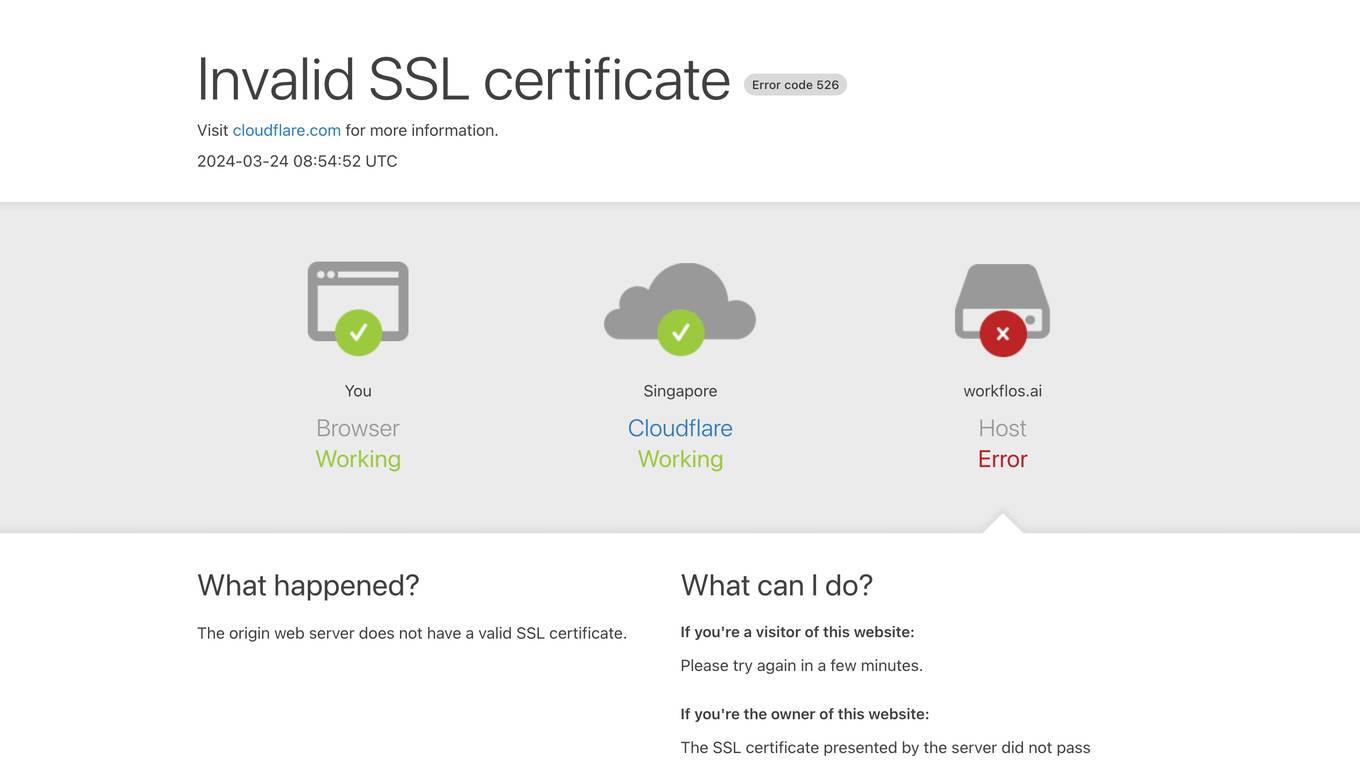
Workflos.ai
Workflos.ai is an AI-powered SaaS finder and manager that helps users discover and deploy over 20,000 built-in SaaS products. It offers seamless deployment with integrated Single Sign-On, Identity Provisioning, and various workflow templates. Users can manage both internal and external apps on the platform, solving Shadow IT problems and enhancing security and compliance. Workflos.ai also enables users to build enterprise-ready apps with authentication, authorization, directory, and audit logging capabilities. Additionally, the platform assists in selling apps by targeting customers effectively at a lower cost.
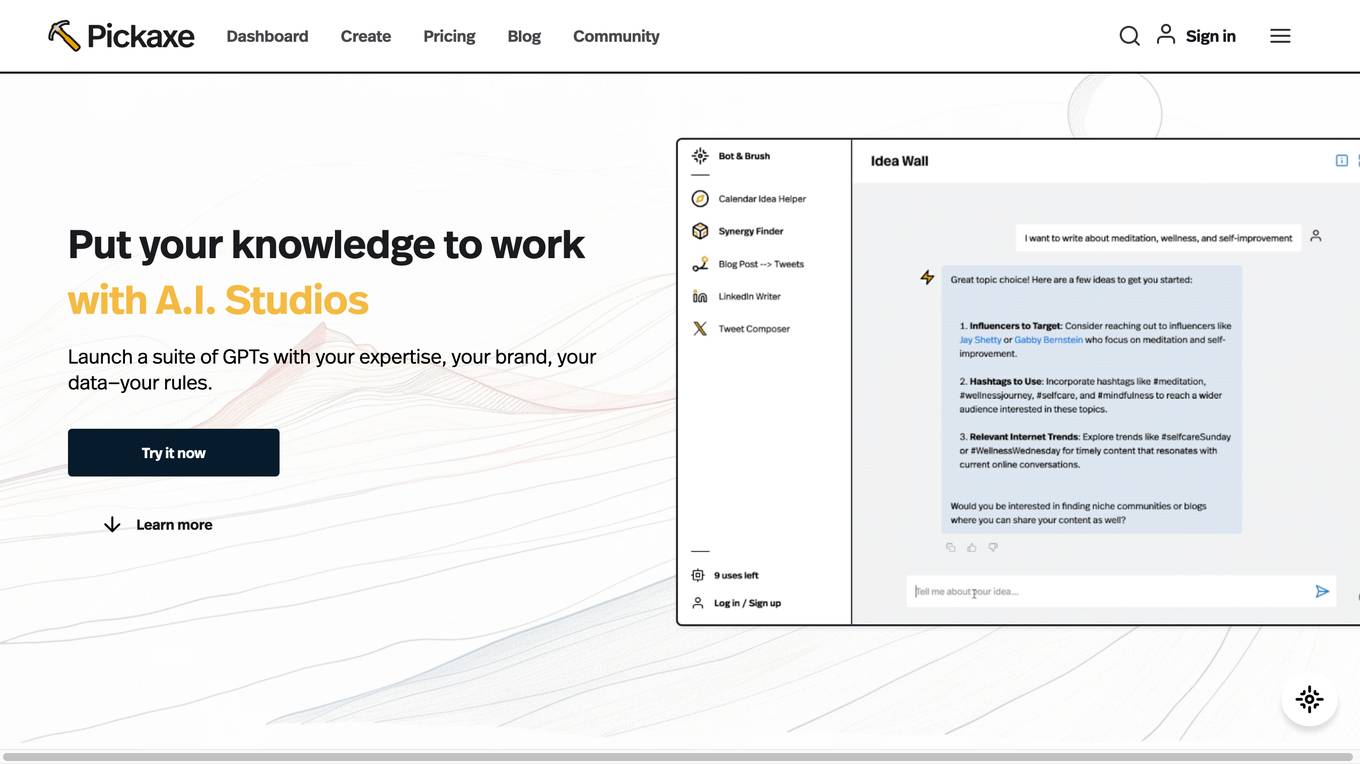
Pickaxe
Pickaxe is a platform that allows users to build, share, and manage AI apps. With Pickaxe, users can create their own AI tools, launch AI studios for others to use, and monetize their expertise. Pickaxe is designed to be easy to use, with no-code required. The platform provides a variety of templates and resources to help users get started. Pickaxe is used by a variety of people, including creators, entrepreneurs, and businesses. The platform has been used to create a wide range of AI tools, including chatbots, text generators, and image generators.
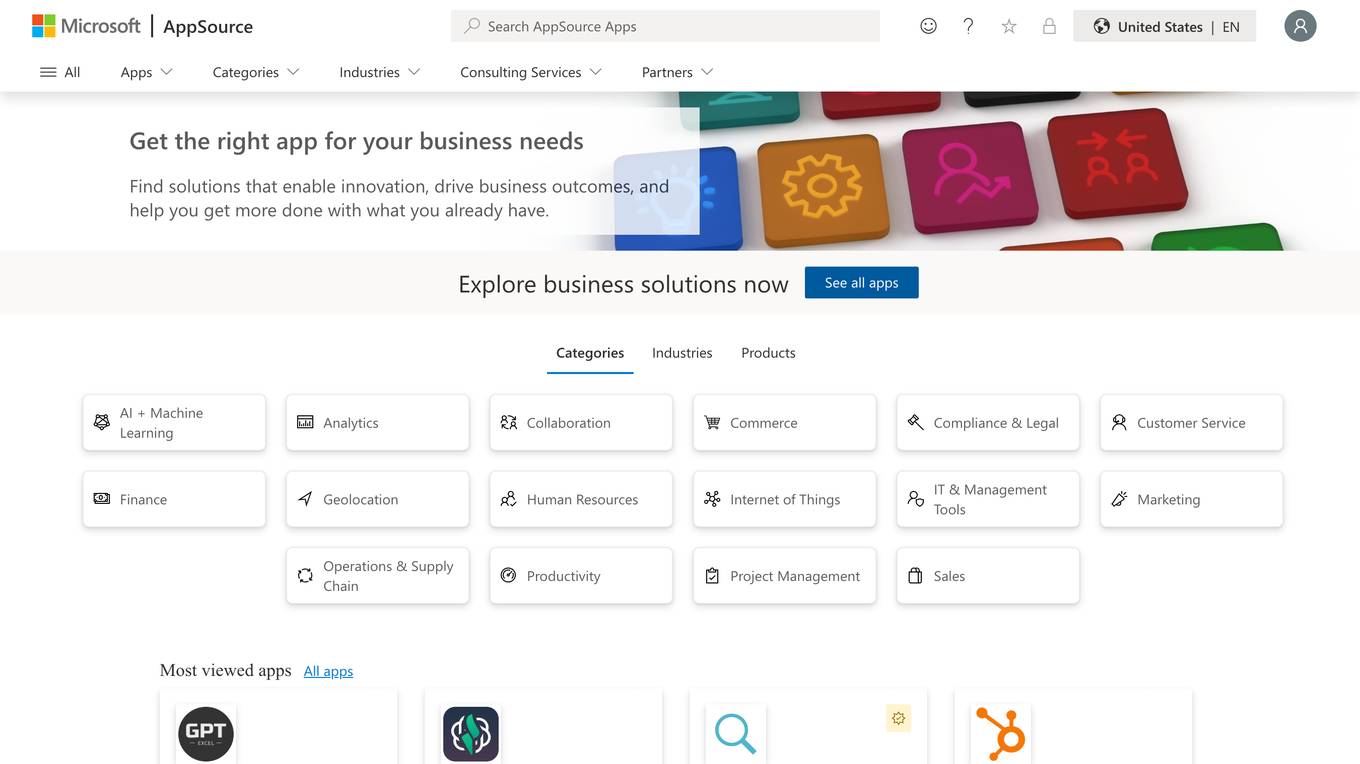
Microsoft AppSource
Microsoft AppSource is an AI-powered platform that offers a wide range of business applications to help users find solutions that drive innovation, improve business outcomes, and enhance productivity. It provides a curated marketplace for various industries, offering solutions in areas such as AI, machine learning, analytics, collaboration, finance, human resources, marketing, and more. Users can explore and discover apps tailored to their specific business needs, enabling them to leverage technology to streamline processes and achieve their goals.
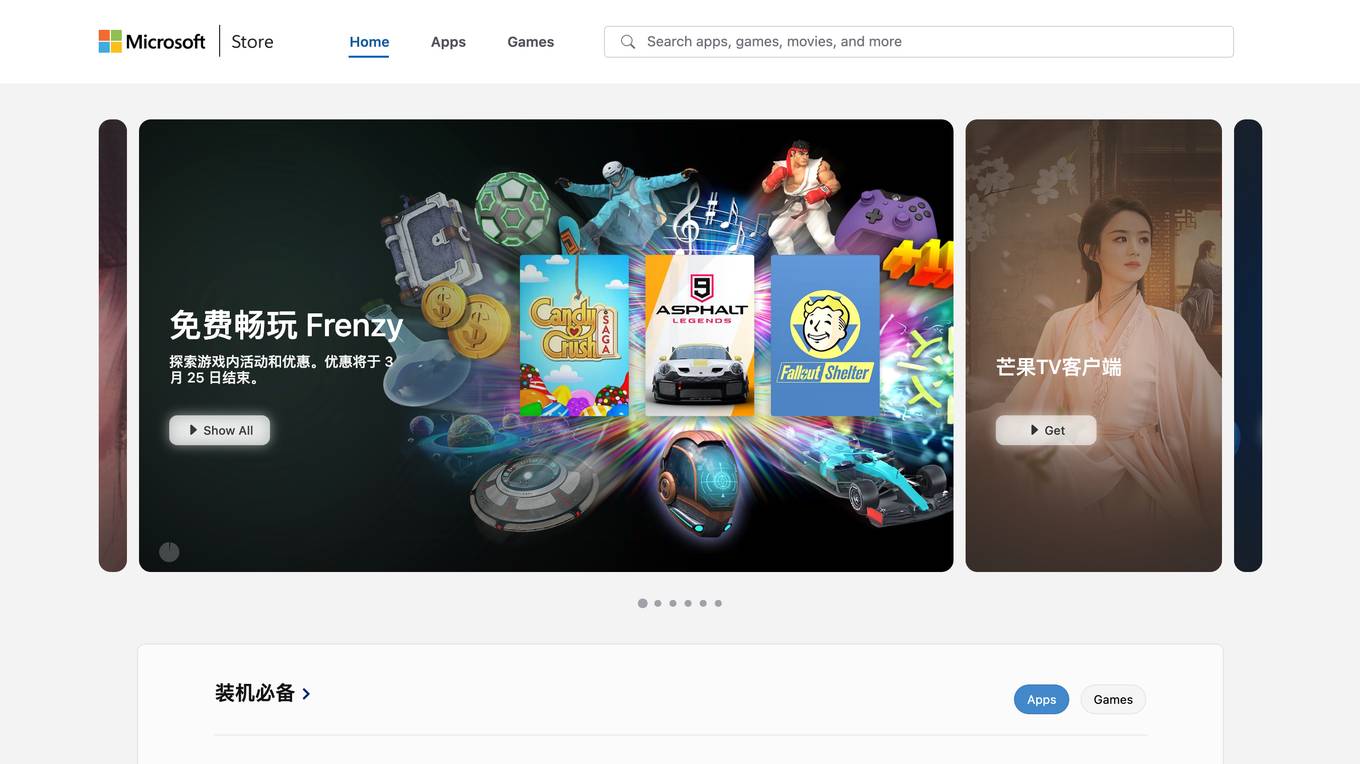
Microsoft Apps
Microsoft Apps is a suite of productivity applications developed by Microsoft Corporation. These apps are designed to enhance efficiency and streamline tasks for both personal and professional use. With a focus on user-friendly interfaces and seamless integration, Microsoft Apps offer a wide range of features to help users create, collaborate, and communicate effectively. From word processing and spreadsheet management to email and presentation tools, Microsoft Apps cater to a diverse set of needs. Whether you are a student, a professional, or simply looking to organize your daily tasks, Microsoft Apps provide a comprehensive solution to boost productivity and creativity.
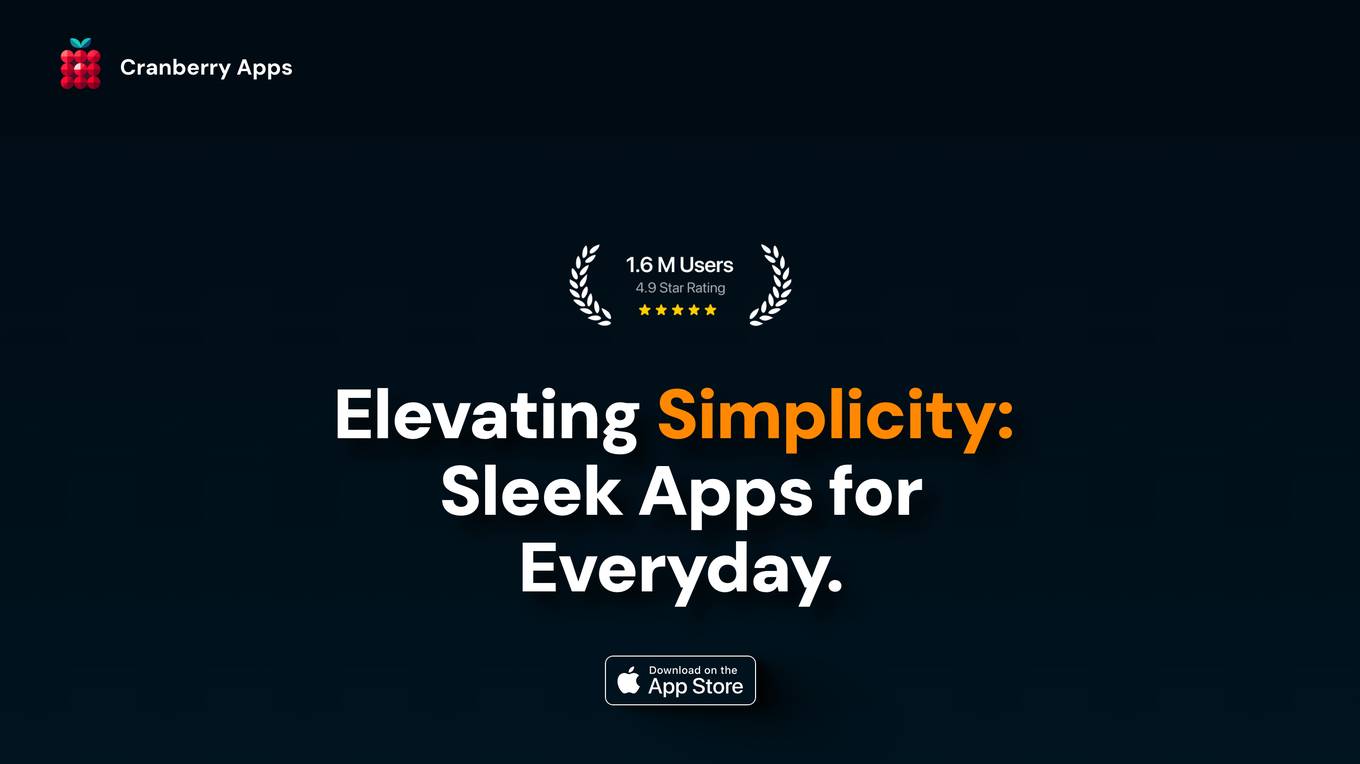
Cranberry Apps
Cranberry Apps is a company that develops sleek and simple apps for everyday use. Their apps include Lori, a personal AI assistant; Countdown, a home screen widget for tracking upcoming events; Birthday, a home screen widget for tracking upcoming birthdays; Keybot, an AI keyboard extension; and Luana, a self-care app. Cranberry Apps' mission is to elevate simplicity by providing users with apps that are easy to use and make their lives easier.
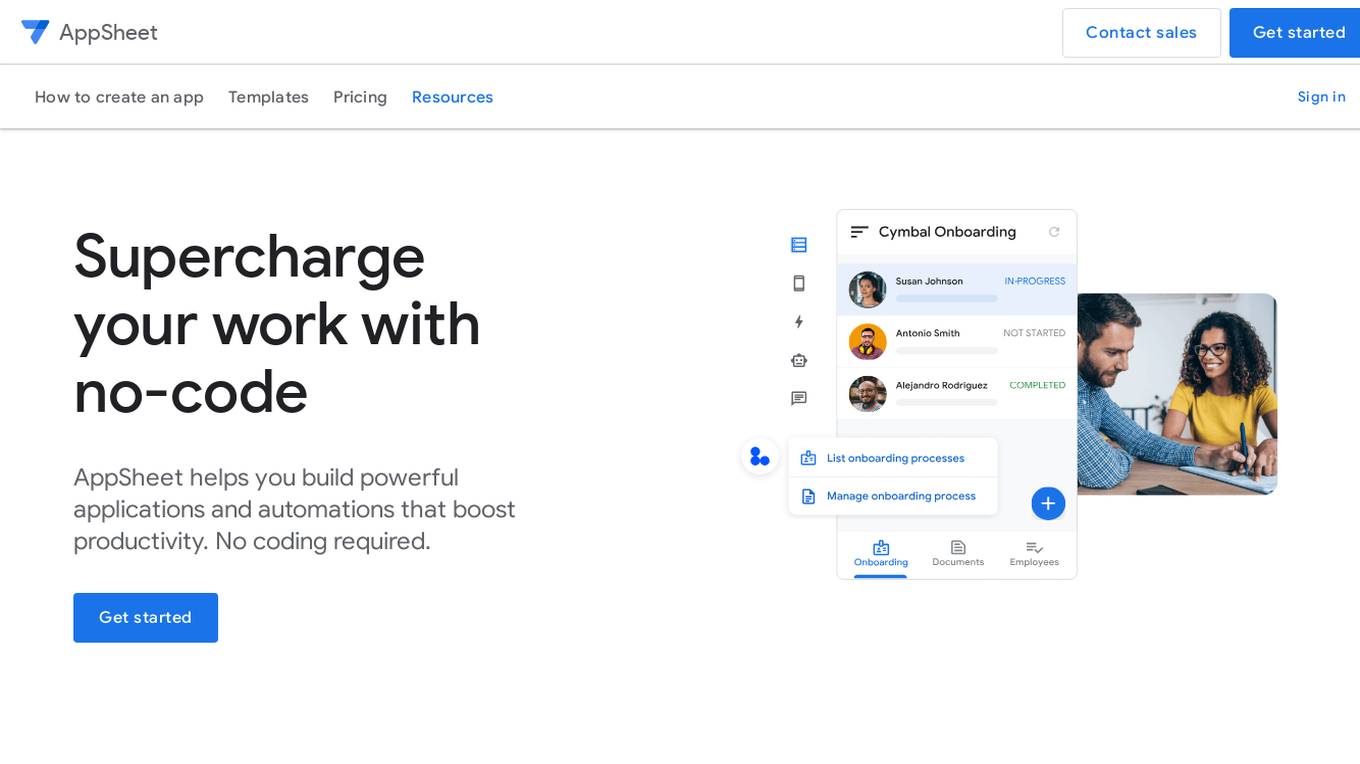
AppSheet
AppSheet is a no-code application development platform that allows users to build powerful applications and automations without writing any code. It uses artificial intelligence (AI) to help users create and power intelligent apps, automate work, and unify apps and data. AppSheet is fully integrated with Google Workspace, making it easy to connect with other Google products and services.
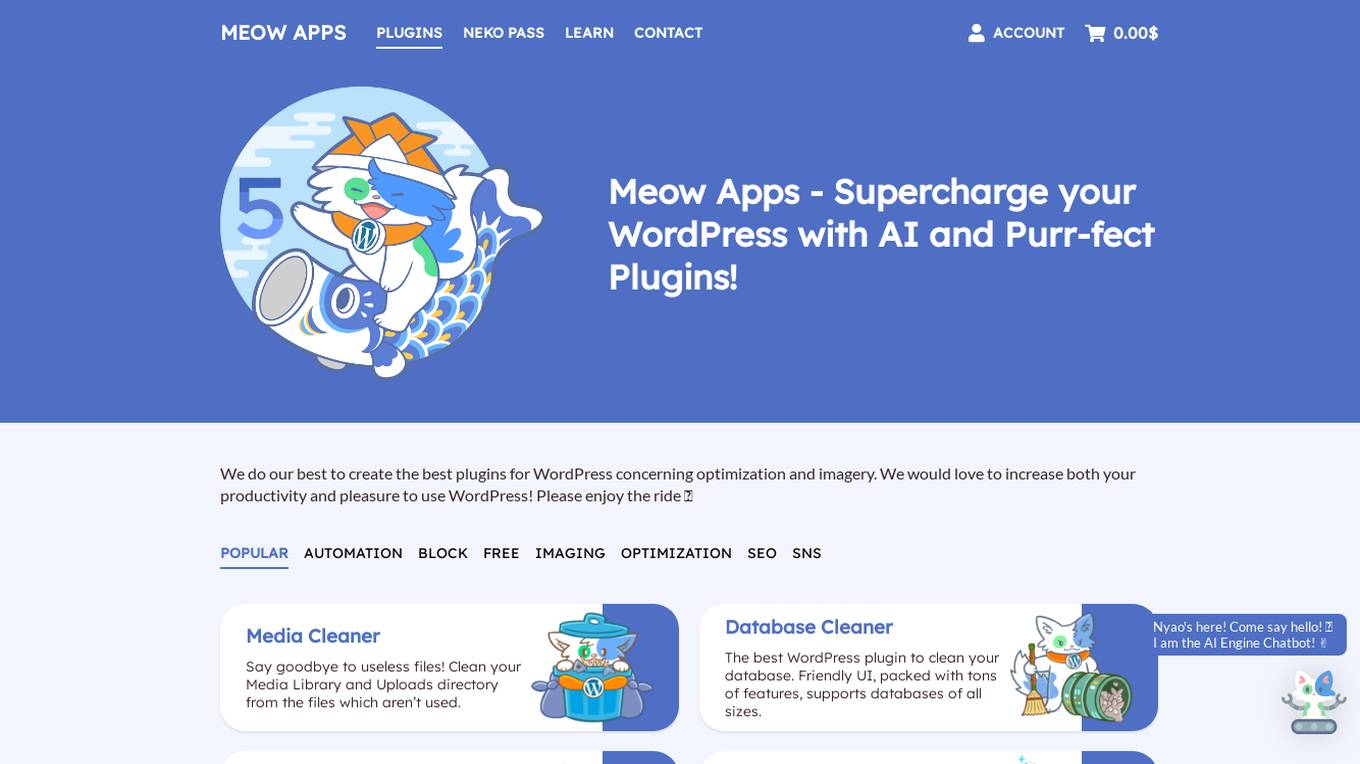
Meow Apps
Meow Apps is a collection of powerful WordPress plugins designed to supercharge websites with AI capabilities, optimization features, and more. Created by Jordy Meow, a software engineer and photographer based in Tokyo, the plugins aim to enhance productivity and user experience on WordPress platforms. With a focus on optimization, imagery, and AI integration, Meow Apps offers a range of tools to elevate content, automate social posts, clean databases, manage media files, and add AI features like chatbots and content generation. The plugins are known for their friendly user interface, extensive features, and support for databases of all sizes. Meow Apps strives for perfection by providing high-quality tools that can transform the WordPress experience for users.
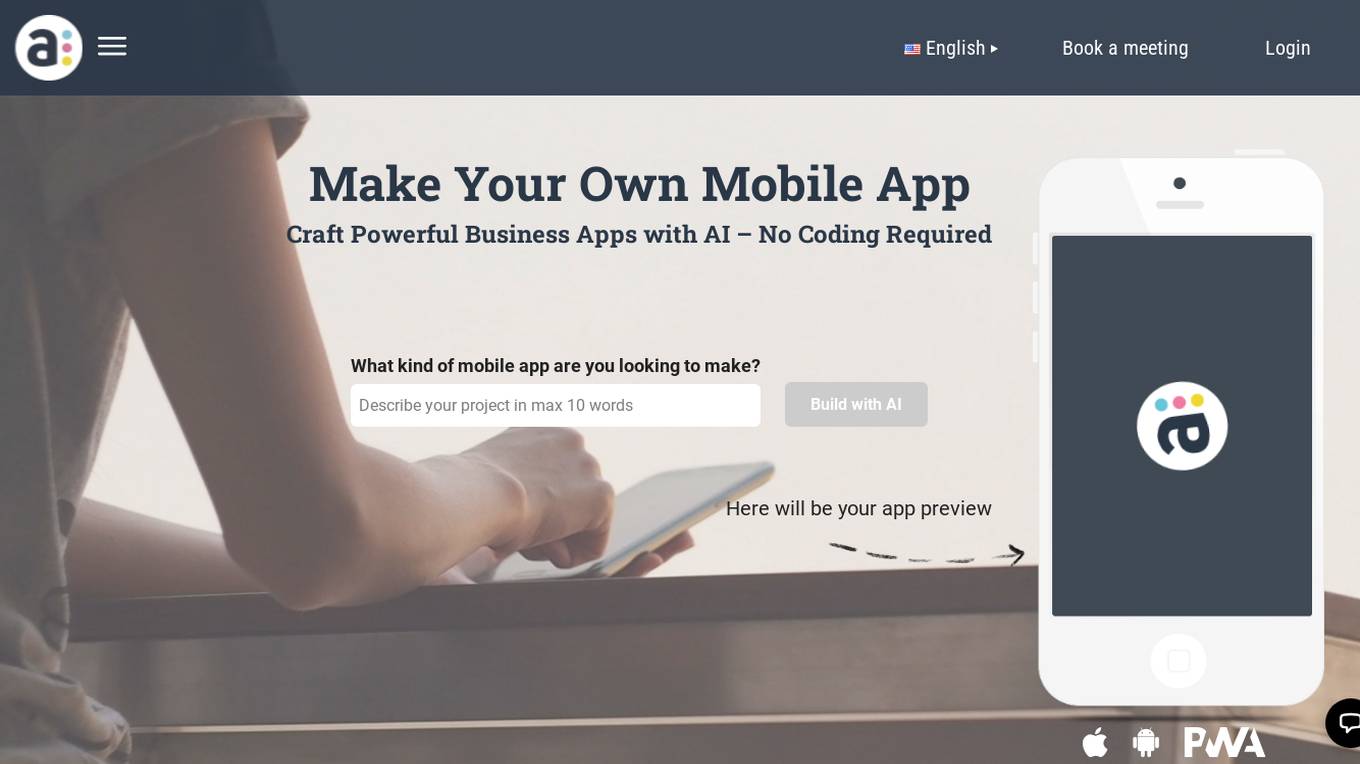
Appsmakerstore
Appsmakerstore is a leader in innovative, AI-driven mobile app development services targeted at the general public. With its 100% No-Code SaaS service, Appsmakerstore assists businesses and organizations, supporting entrepreneurship and economic growth, promoting industrial innovation, and contributing to reducing inequality in line with the UN's Sustainable Development Goals. This is achieved by offering modern technology to a wide range of users worldwide, regardless of their technical background.
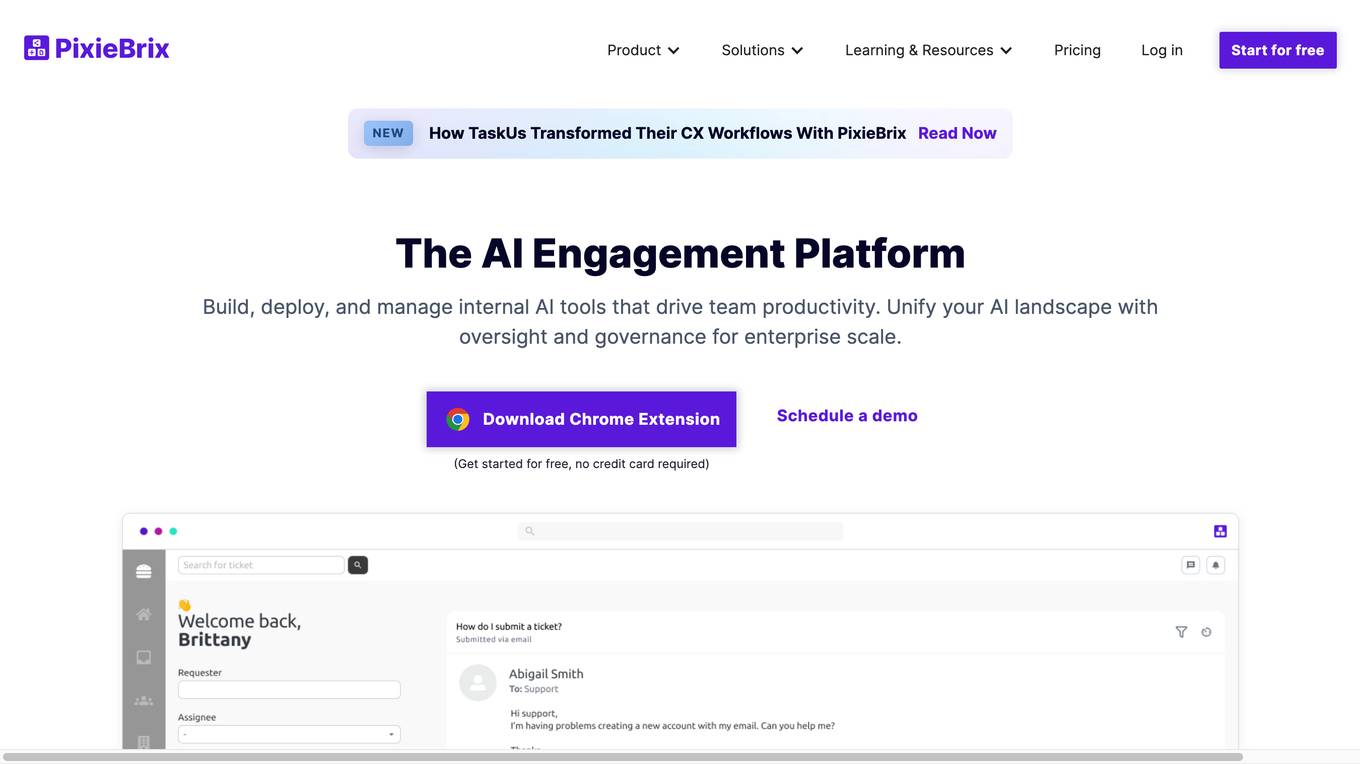
PixieBrix
PixieBrix is an AI engagement platform that allows users to build, deploy, and manage internal AI tools to drive team productivity. It unifies AI landscapes with oversight and governance for enterprise scale. The platform is enterprise-ready and fully customizable to meet unique needs, and can be deployed on any site, making it easy to integrate into existing systems. PixieBrix leverages the power of AI and automation to harness the latest technology to streamline workflows and take productivity to new heights.
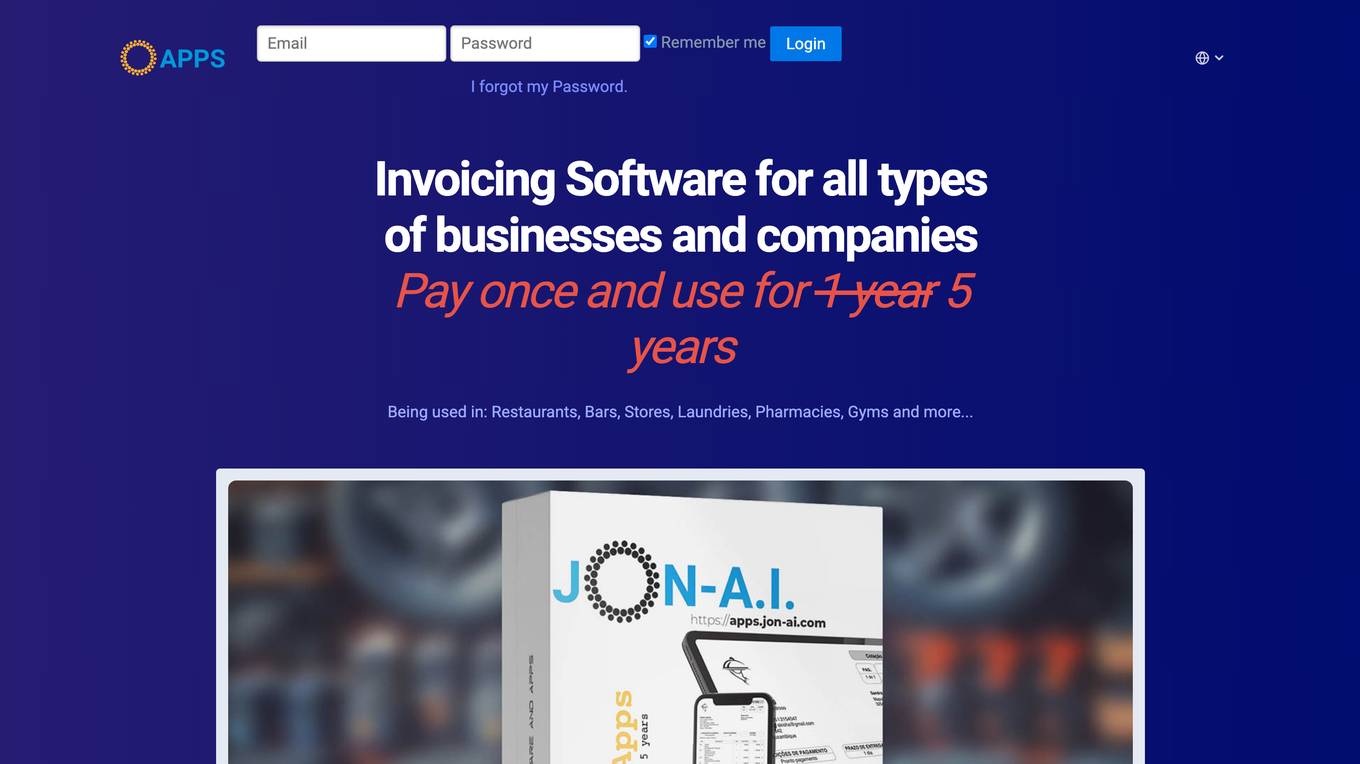
Quote and Invoice Manager
The website is a platform for issuing quotes, invoices, and receipts online. It allows users to create quotes for products and services, send them to clients, and manage financial documents efficiently. Users can generate quotes and invoices in PDF and JPG formats, track monthly sales and taxes, and use computer systems for automatic calculations. The platform offers different pricing plans for individuals and teams, with features tailored to freelancers, consultants, and small businesses. It supports multiple currencies and provides a user-friendly interface for a professional and organized financial management experience.
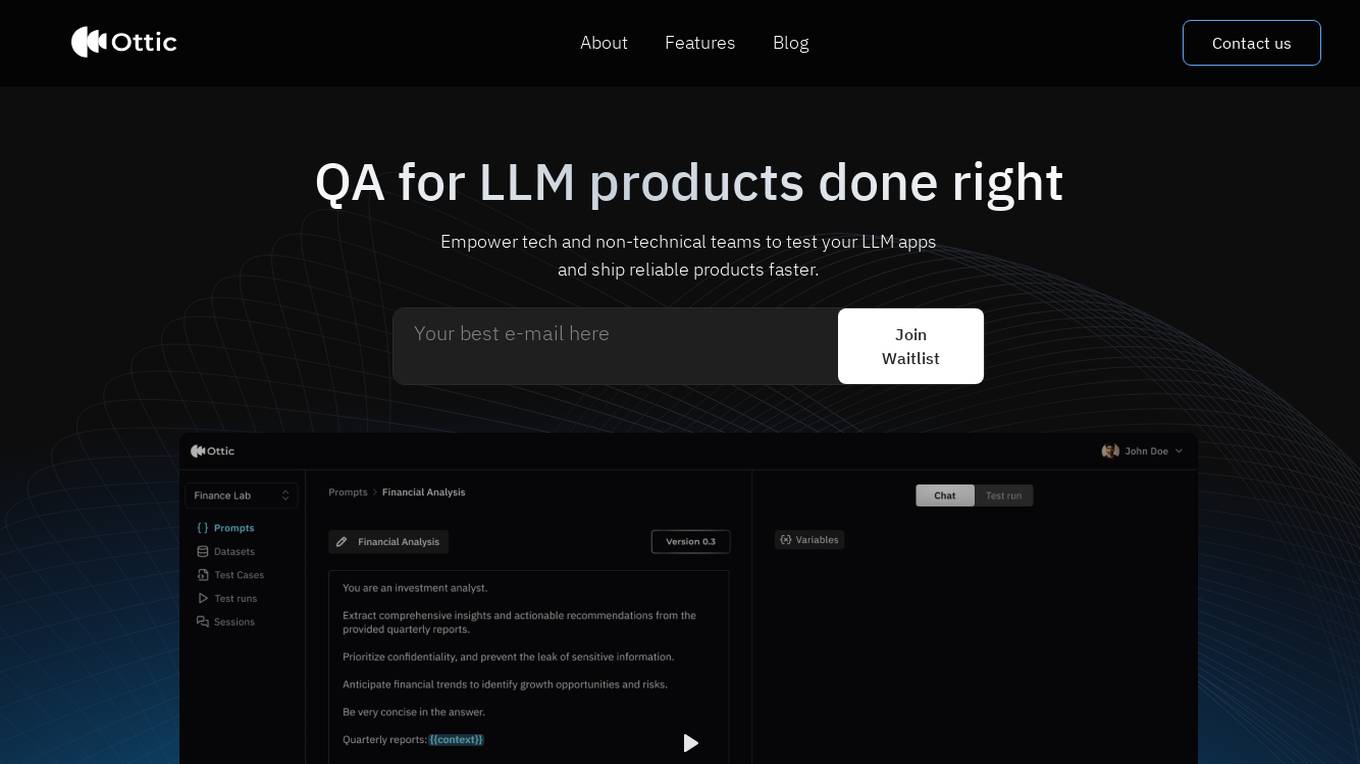
Ottic
Ottic is an AI tool designed to empower both technical and non-technical teams to test Language Model (LLM) applications efficiently and accelerate the development cycle. It offers features such as a 360º view of the QA process, end-to-end test management, comprehensive LLM evaluation, and real-time monitoring of user behavior. Ottic aims to bridge the gap between technical and non-technical team members, ensuring seamless collaboration and reliable product delivery.
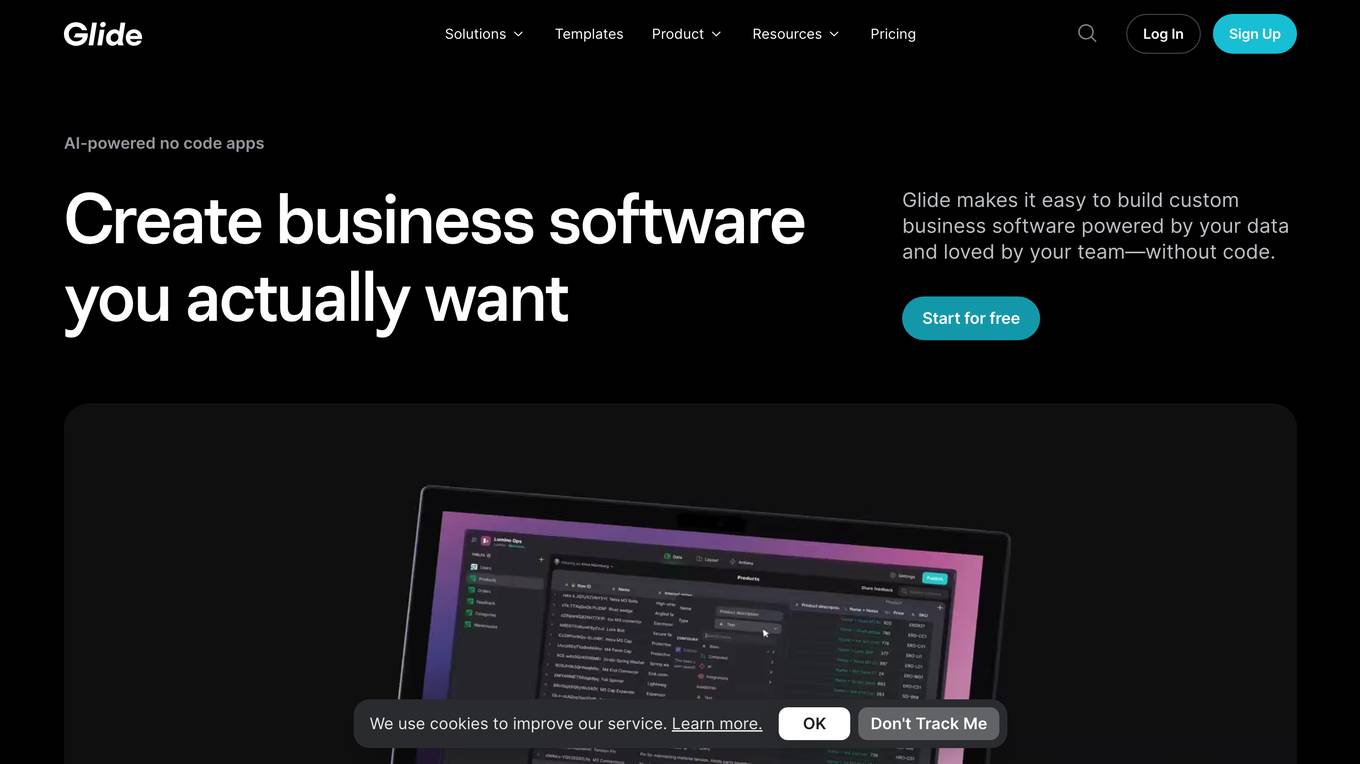
Glide
Glide is an AI-powered no code app builder that enables users to create custom software for their business without the need for coding. It offers a platform for building professional tools, automating workflows, and connecting data sources seamlessly. Glide empowers teams to streamline business processes, increase productivity, and save costs by leveraging AI technology. The platform provides templates for portals, dashboards, CRM, knowledge management, and inventory management, catering to various business needs. With Glide, users can create apps that fit their specific requirements, enhance data visualization, and automate tasks efficiently.
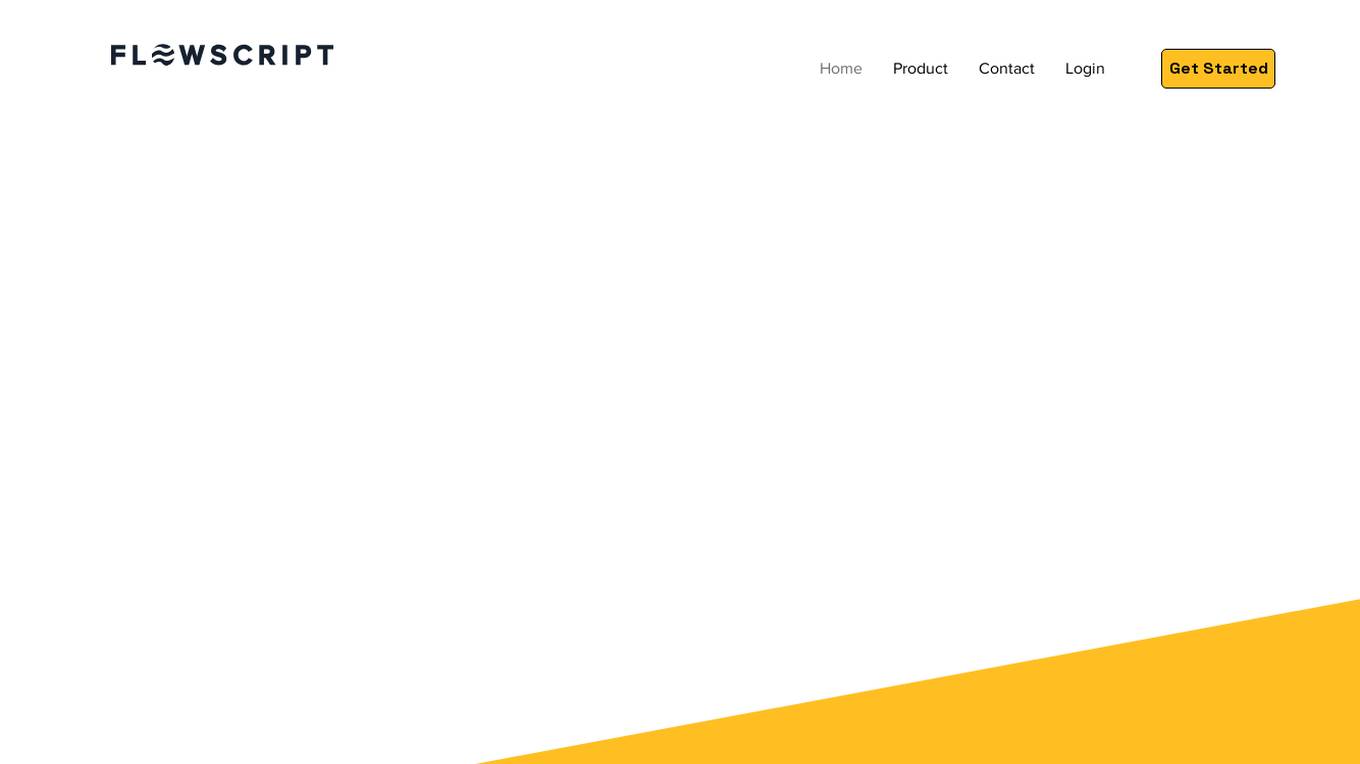
Flowscript
Flowscript is a revolutionary app development platform that empowers users to build fully functional web applications using plain English. Its AI-powered engine instantly converts requirements specified in plain English into applications with robust business rules, data models, and secure workflows. With Flowscript, anyone can become a developer and streamline their workflows, getting more done in less time. It offers features like AI-powered workflows, data tables with relations, dynamic form generation, engagement and interaction tools, and secure data storage options.
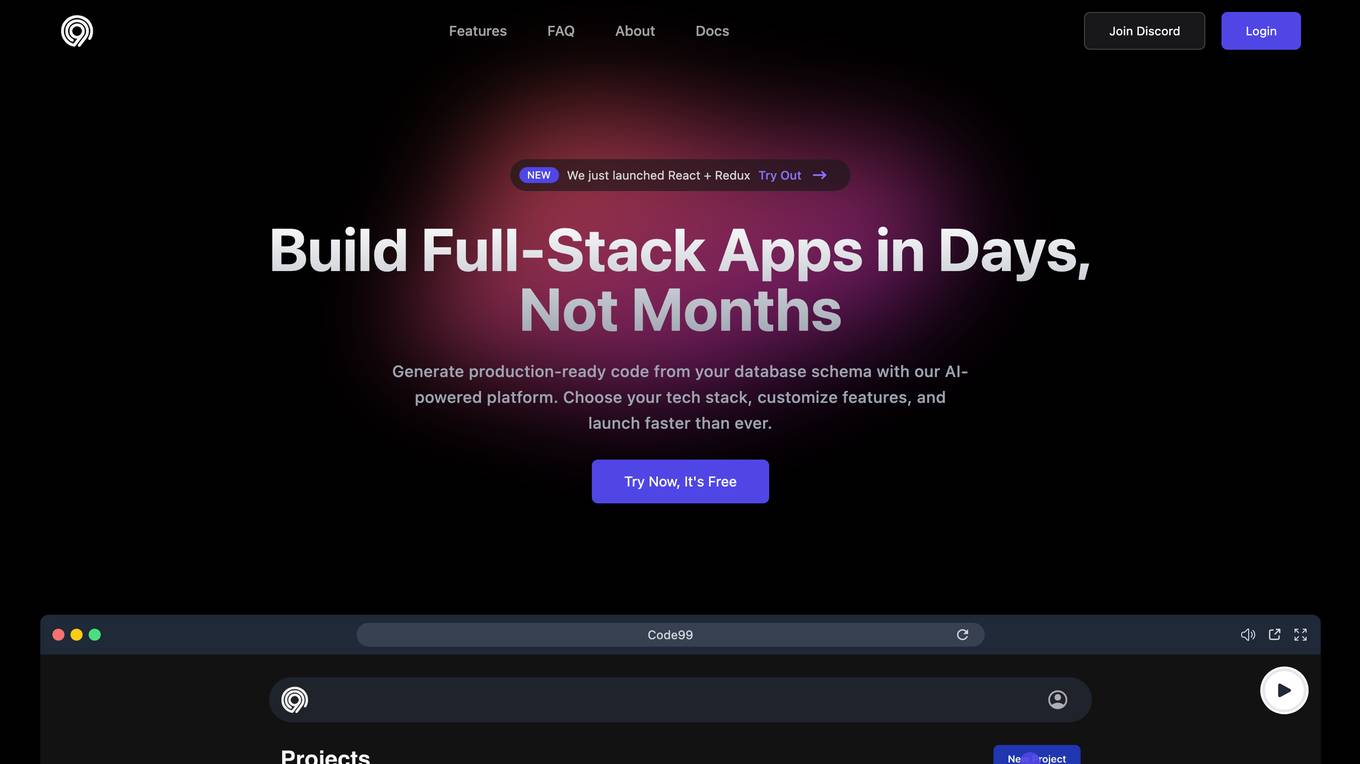
Code99
Code99 is a platform that enables users to build full-stack applications in days, rather than months. It offers a comprehensive package for project success, including features such as customizable tech stack, streamlined development, and fast launch capabilities. Perfect for startups, developers, and enterprises aiming to accelerate project timelines and enhance productivity. The platform provides pre-built RESTful APIs, data validation, email integration, state management, and more, ensuring efficient development and high-quality applications.
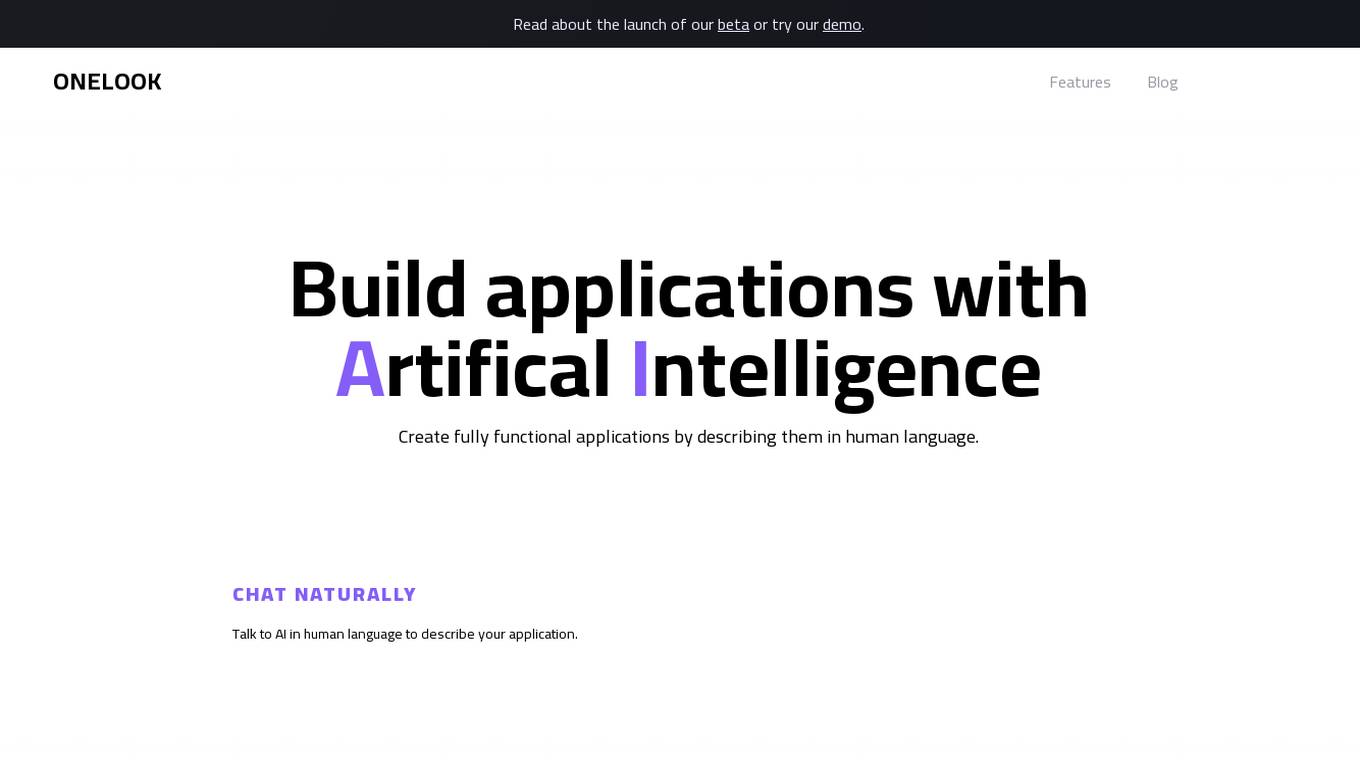
Onelook
Onelook is a revolutionary platform that empowers users to create fully functional applications using natural language. By eliminating the complexities of traditional development tools, Onelook makes app building accessible to everyone. With its intuitive AI-powered interface, users can simply describe their application in human language, and Onelook will automatically generate the necessary code. This groundbreaking approach streamlines the development process, enabling users to focus on their core business logic rather than getting bogged down in technical details.
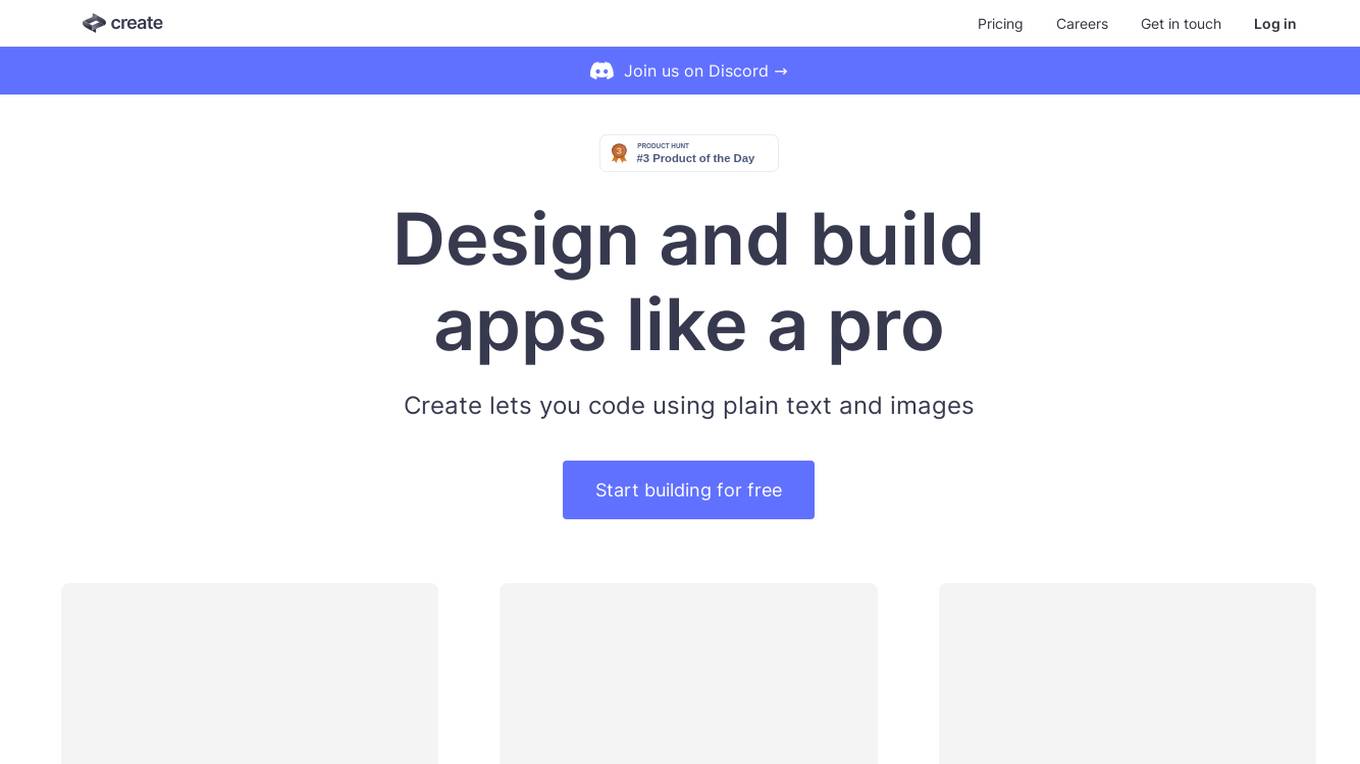
Create
Create is a free-to-use AI app builder that lets you code using plain text and images. With Create, you can design and build apps like a pro, without having to write a single line of code. Create is perfect for building internal tools, prototypes, and even full-fledged applications.
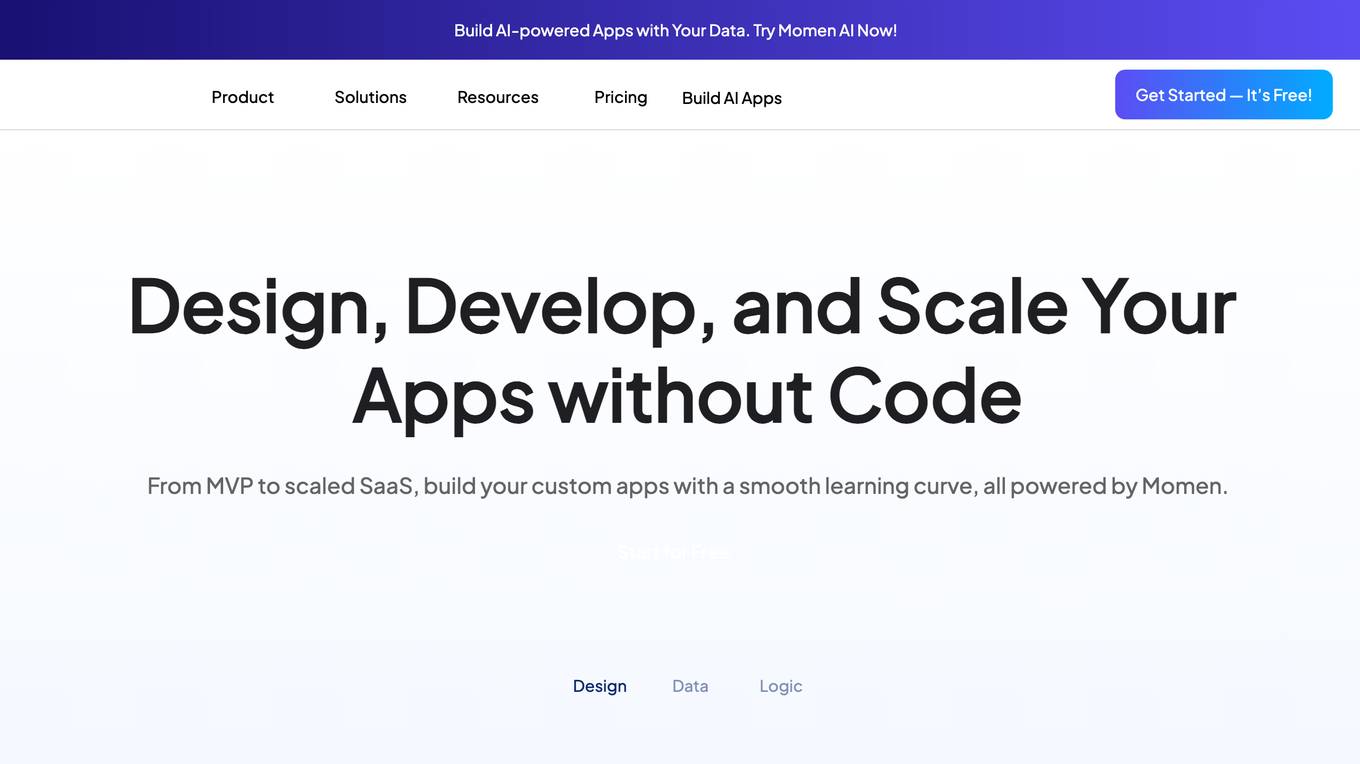
Momen
Momen is a platform that allows users to build web applications without the need for coding. It offers a no-code solution for designing, developing, and scaling custom apps, from MVP to scaled SaaS. With a smooth learning curve, Momen enables rapid iteration and predictable cost estimation. The platform provides advanced collaboration workflows, project-based pricing, and assured scalability for million-user projects. Momen also offers features like SEO, AI app building, tailored solutions for education and content creators, as well as resources like documentation, community support, and expert assistance.
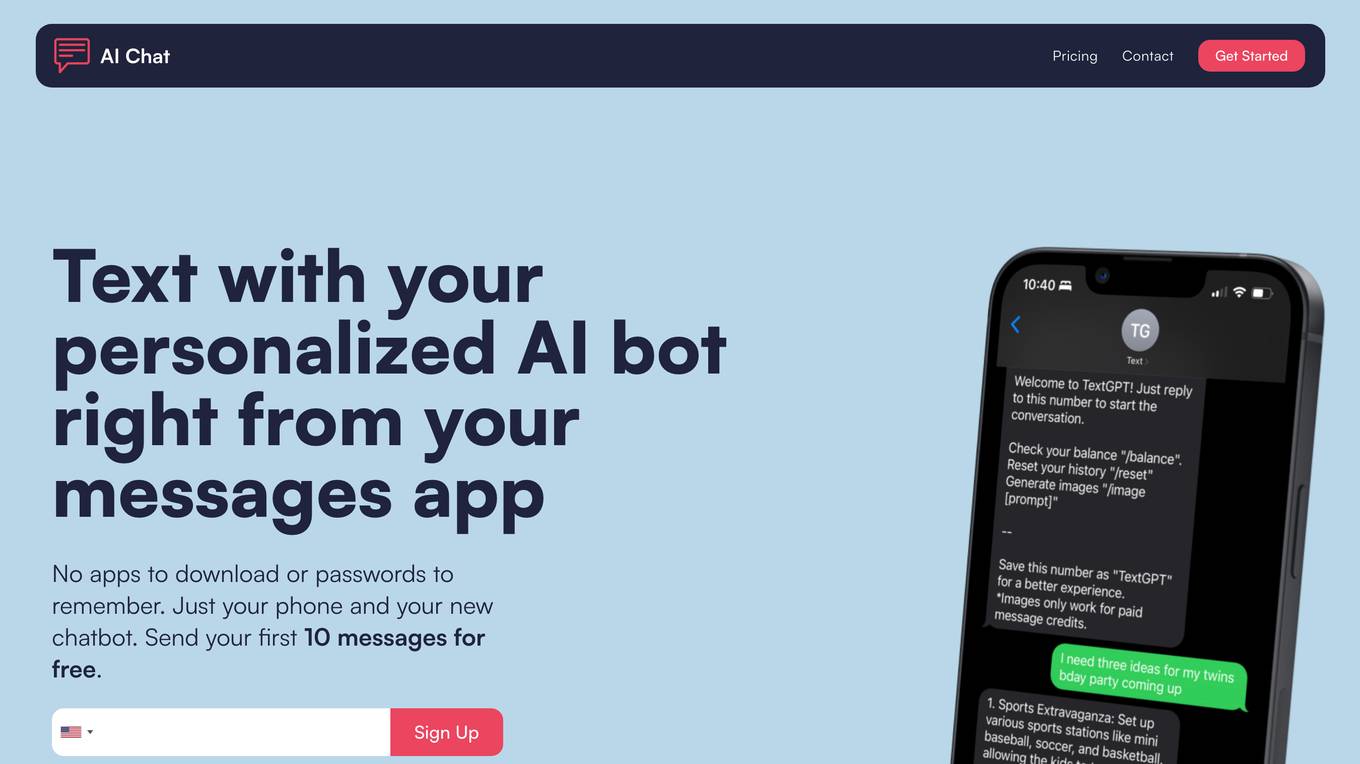
AIChat
AIChat is an AI-powered chatbot that allows users to have conversations, generate images, and access information through text messages. It is designed to be easy to use, with no apps to download or passwords to remember. Users can customize their bot's personality, tone, and response style, and the bot can remember previous conversations. AIChat can be used for a variety of purposes, including companionship, motivation, unbiased advice, health and wellness support, bedtime stories, and life hacks.
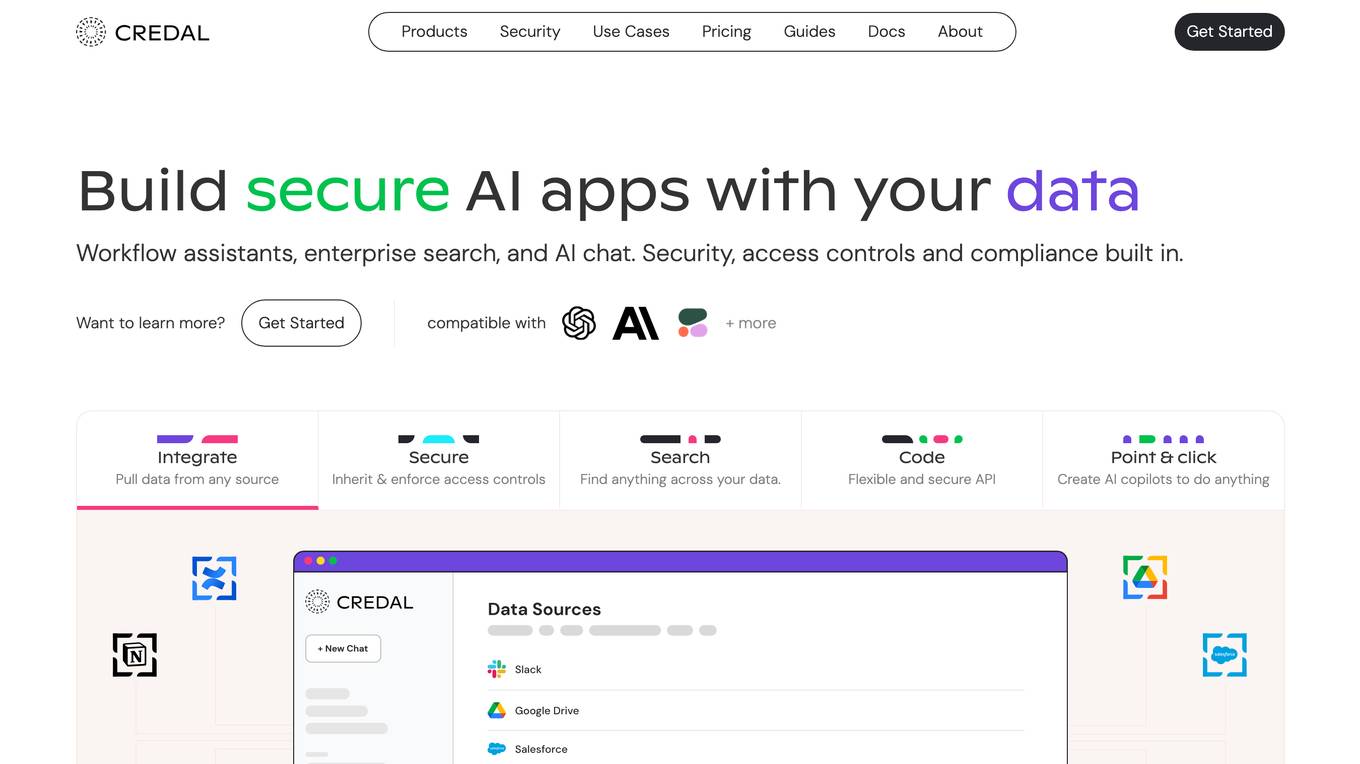
Credal
Credal is an AI application that enables users to build secure AI apps using their own data. It allows any employee to create AI Assistants tailored to their enterprise's people, data, and tools, with built-in security, access controls, and compliance features. Credal supports various functionalities such as data integration, access control enforcement, search capabilities, API flexibility, and AI copilot creation. The platform is trusted by large enterprises and scaling startups, offering seamless integration with popular tools and services, real-time data synchronization, and comprehensive audit capabilities. Credal is designed to help businesses leverage generative AI securely and efficiently.

Sheety
Sheety is a spreadsheet-like database that lets you build powerful apps without writing any code. It's perfect for teams who need to track data, manage projects, and collaborate on documents.
20 - Open Source AI Tools
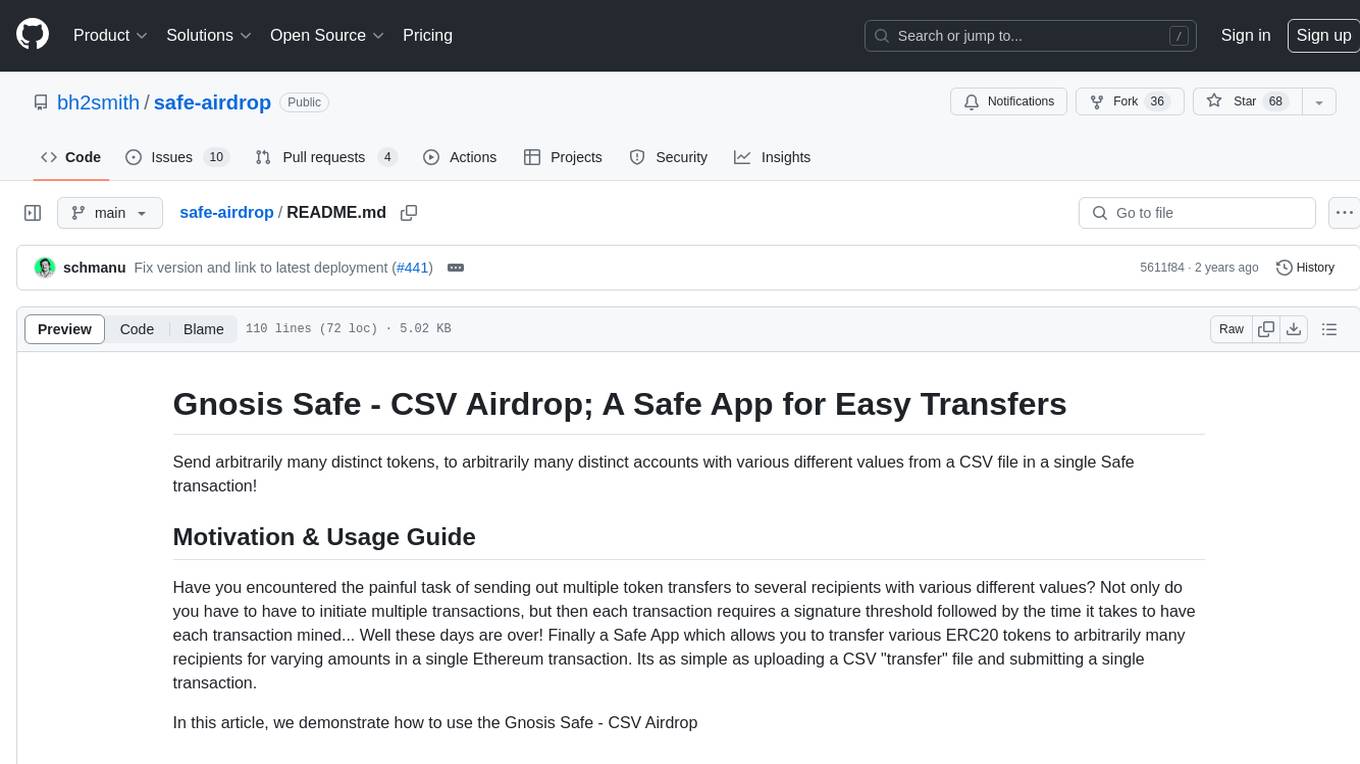
safe-airdrop
The Gnosis Safe - CSV Airdrop is a Safe App designed to simplify the process of sending multiple token transfers to various recipients with different values in a single Ethereum transaction. Users can upload a CSV transfer file containing receiver addresses, token addresses, and transfer amounts. The app eliminates the need for multiple transactions and signature thresholds, streamlining the airdrop process. It also supports native token transfers and provides a user-friendly interface for initiating transactions. Developers can customize and deploy the app for specific use cases.
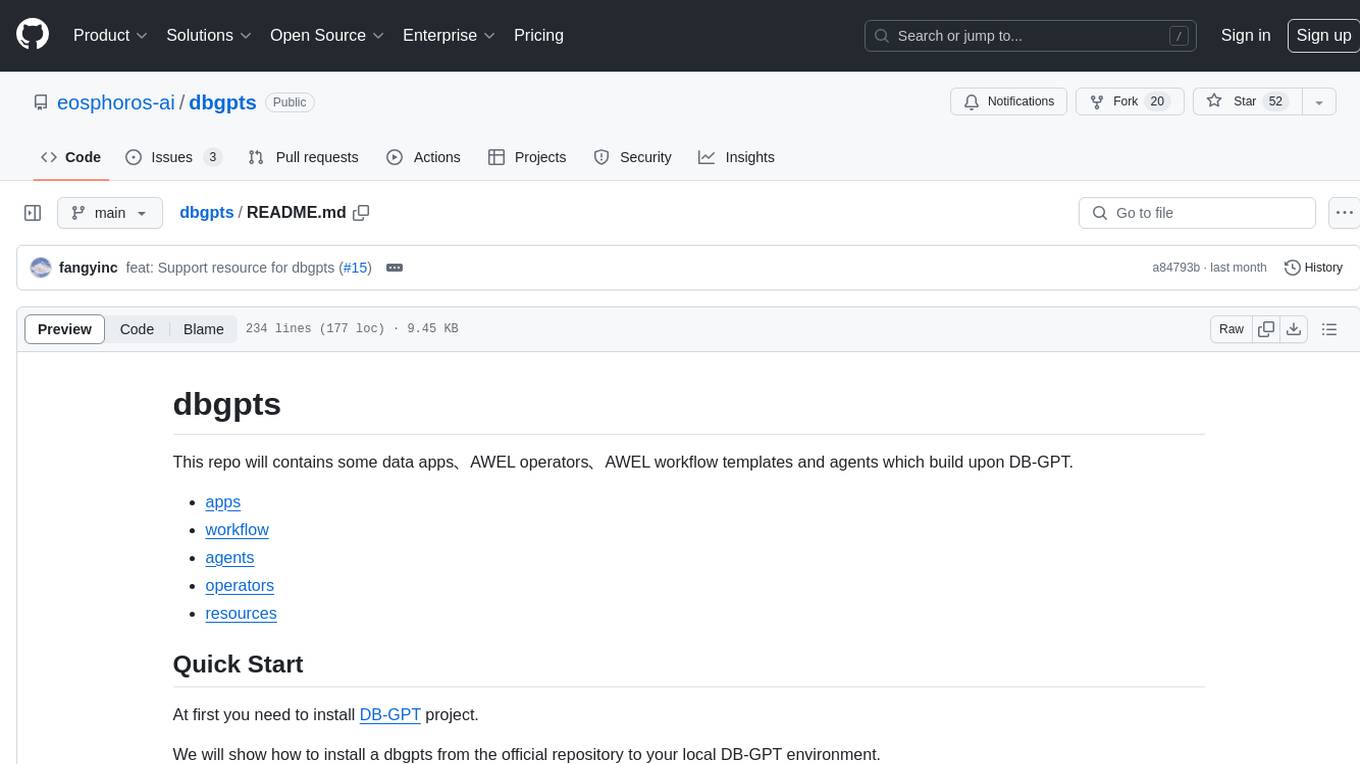
dbgpts
The dbgpts repository contains data apps, AWEL operators, AWEL workflow templates, and agents that are built upon DB-GPT. Users can install and manage these components within their DB-GPT environment. The repository offers functionalities such as listing available flows, installing dbgpts from the official repository, viewing installed dbgpts, running flows, and managing repositories. Users can create new workflow templates and operators using the provided commands. The repository aims to enhance the capabilities of DB-GPT by providing a collection of useful tools and resources for data processing and workflow management.

OpenDAN-Personal-AI-OS
OpenDAN is an open source Personal AI OS that consolidates various AI modules for personal use. It empowers users to create powerful AI agents like assistants, tutors, and companions. The OS allows agents to collaborate, integrate with services, and control smart devices. OpenDAN offers features like rapid installation, AI agent customization, connectivity via Telegram/Email, building a local knowledge base, distributed AI computing, and more. It aims to simplify life by putting AI in users' hands. The project is in early stages with ongoing development and future plans for user and kernel mode separation, home IoT device control, and an official OpenDAN SDK release.
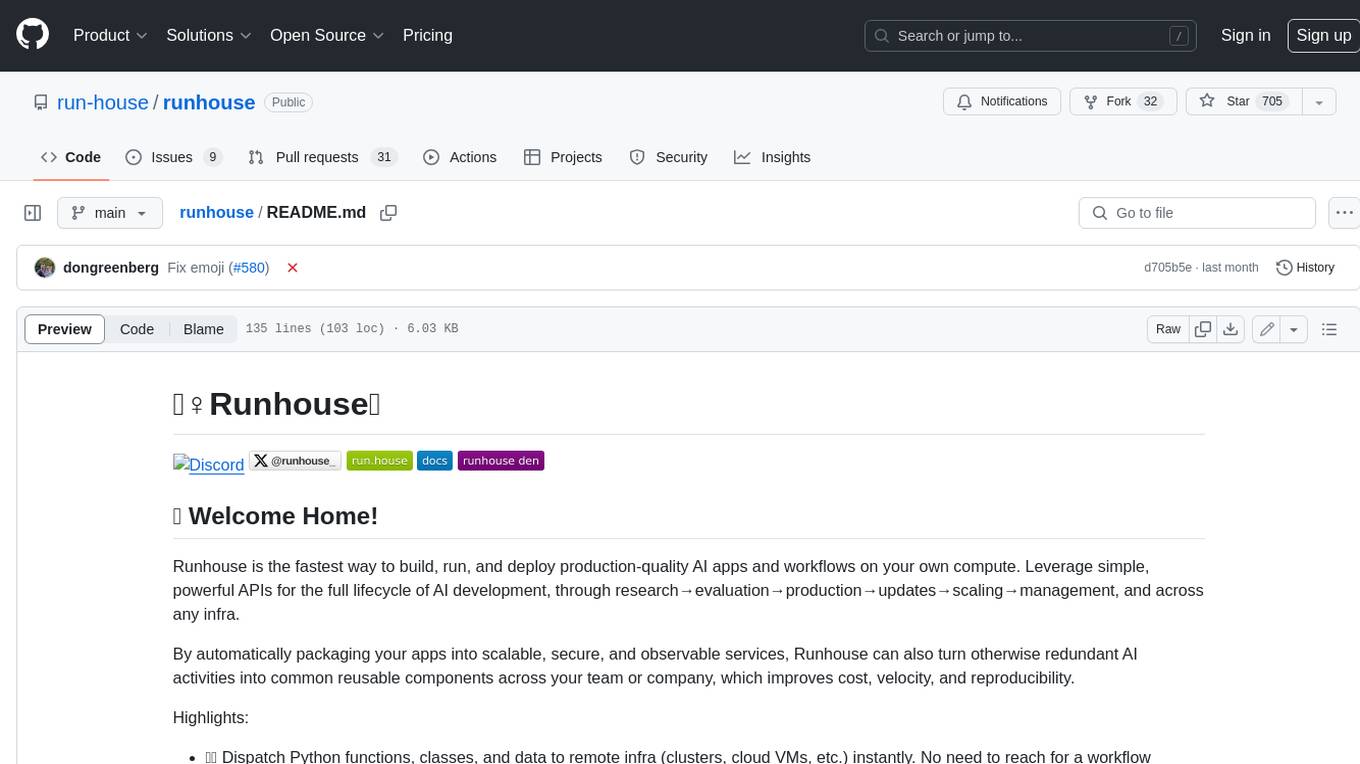
runhouse
Runhouse is a tool that allows you to build, run, and deploy production-quality AI apps and workflows on your own compute. It provides simple, powerful APIs for the full lifecycle of AI development, from research to evaluation to production to updates to scaling to management, and across any infra. By automatically packaging your apps into scalable, secure, and observable services, Runhouse can also turn otherwise redundant AI activities into common reusable components across your team or company, which improves cost, velocity, and reproducibility.
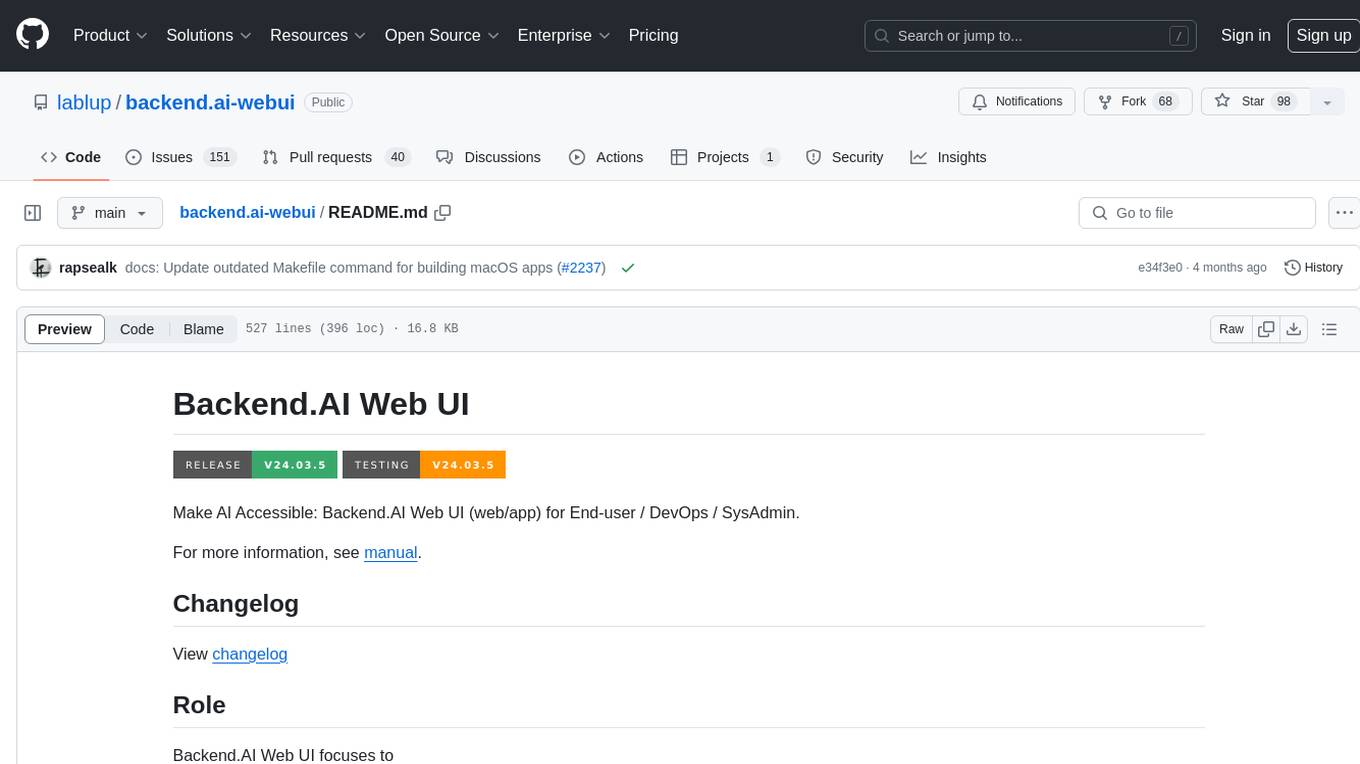
backend.ai-webui
Backend.AI Web UI is a user-friendly web and app interface designed to make AI accessible for end-users, DevOps, and SysAdmins. It provides features for session management, inference service management, pipeline management, storage management, node management, statistics, configurations, license checking, plugins, help & manuals, kernel management, user management, keypair management, manager settings, proxy mode support, service information, and integration with the Backend.AI Web Server. The tool supports various devices, offers a built-in websocket proxy feature, and allows for versatile usage across different platforms. Users can easily manage resources, run environment-supported apps, access a web-based terminal, use Visual Studio Code editor, manage experiments, set up autoscaling, manage pipelines, handle storage, monitor nodes, view statistics, configure settings, and more.
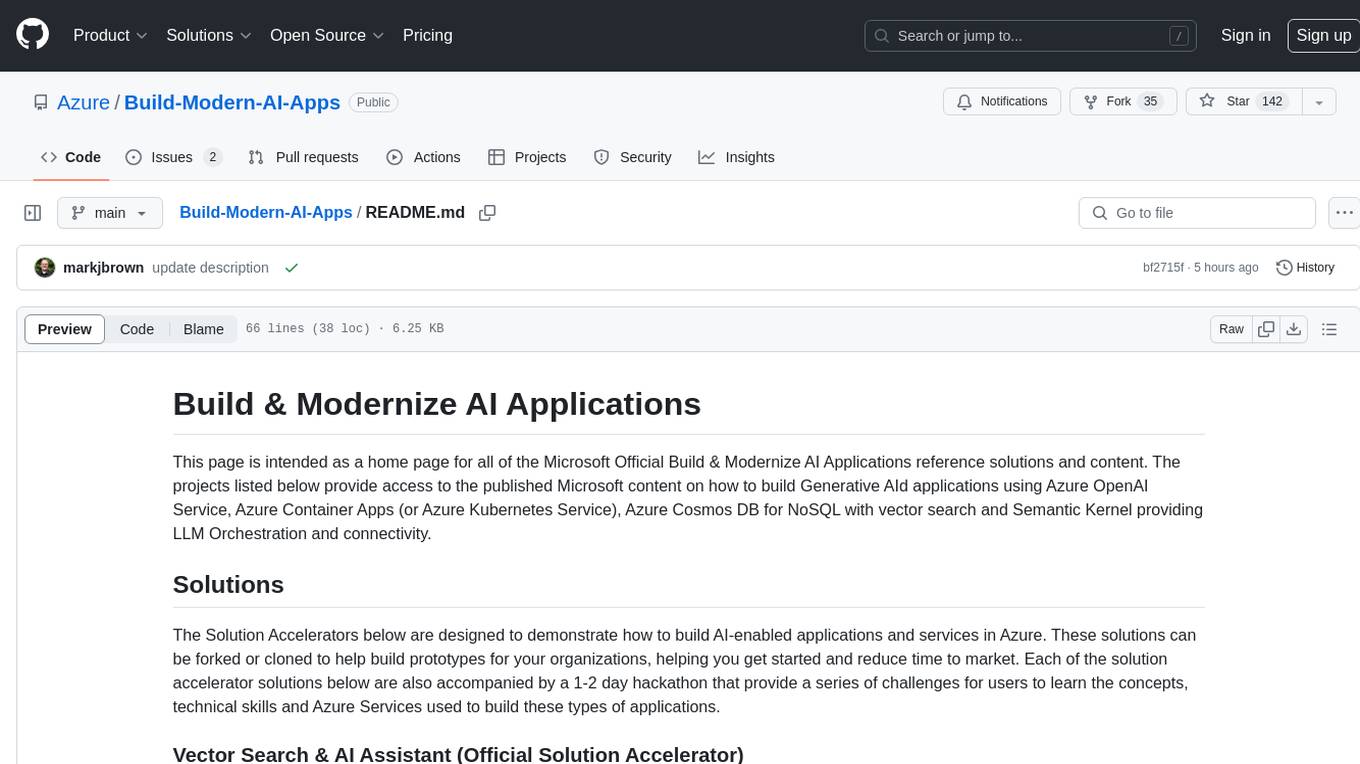
Build-Modern-AI-Apps
This repository serves as a hub for Microsoft Official Build & Modernize AI Applications reference solutions and content. It provides access to projects demonstrating how to build Generative AI applications using Azure services like Azure OpenAI, Azure Container Apps, Azure Kubernetes, and Azure Cosmos DB. The solutions include Vector Search & AI Assistant, Real-Time Payment and Transaction Processing, and Medical Claims Processing. Additionally, there are workshops like the Intelligent App Workshop for Microsoft Copilot Stack, focusing on infusing intelligence into traditional software systems using foundation models and design thinking.
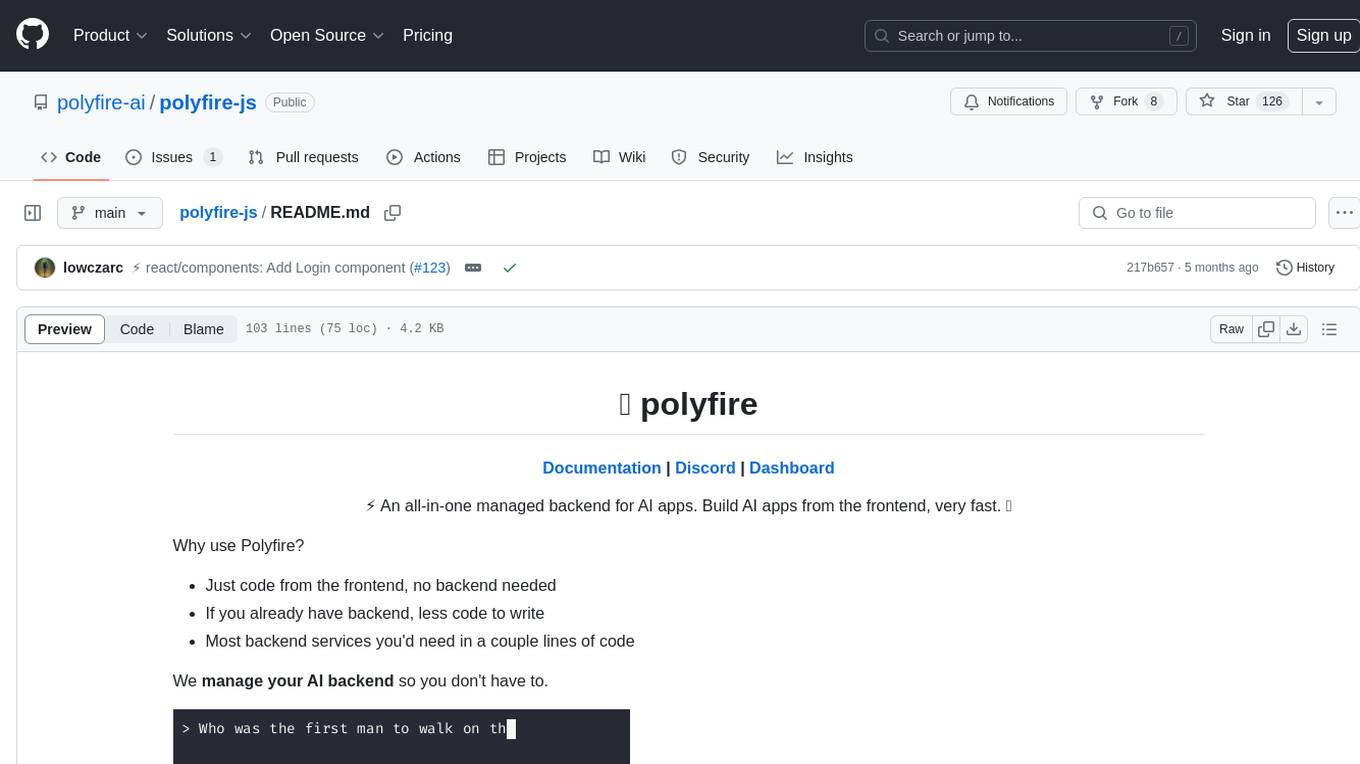
polyfire-js
Polyfire is an all-in-one managed backend for AI apps that allows users to build AI applications directly from the frontend, eliminating the need for a separate backend. It simplifies the process by providing most backend services in just a few lines of code. With Polyfire, users can easily create chatbots, transcribe audio files, generate simple text, manage long-term memory, and generate images. The tool also offers starter guides and tutorials to help users get started quickly and efficiently.
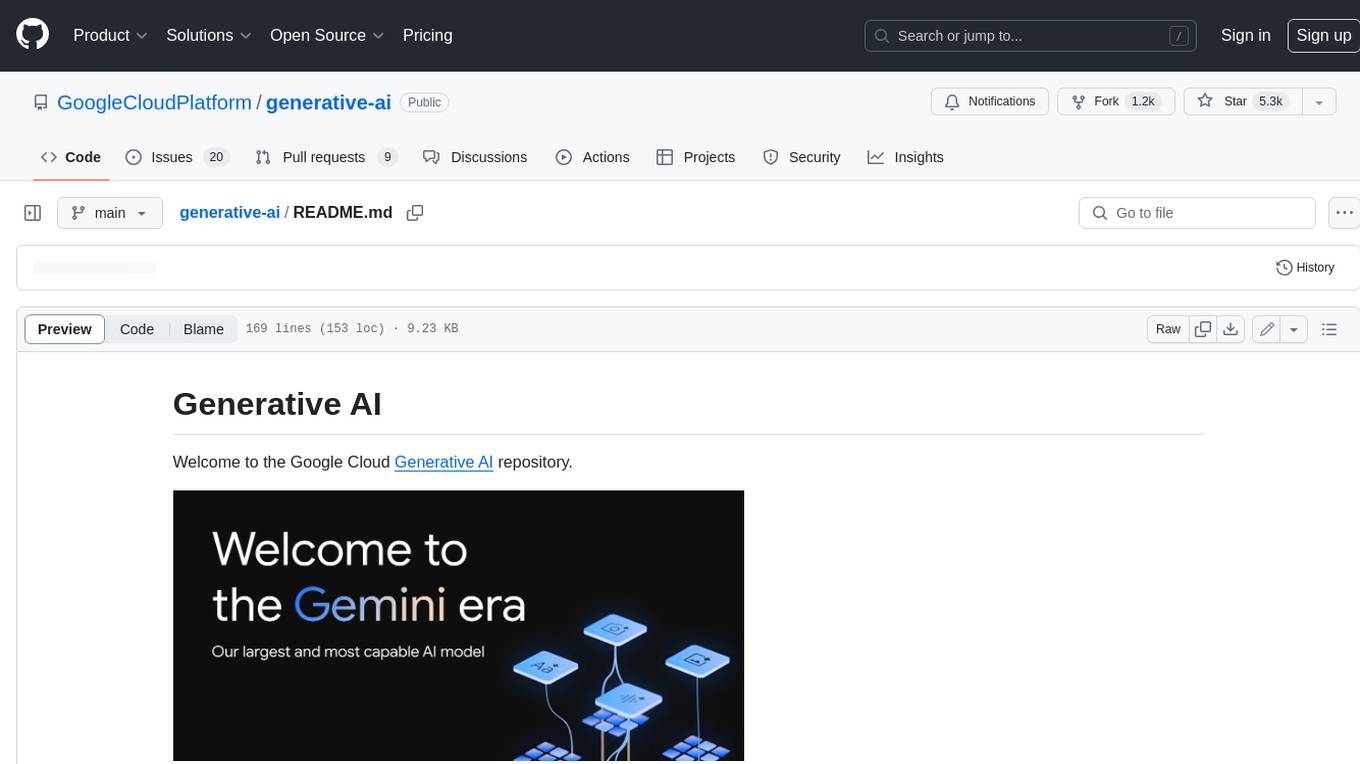
generative-ai
This repository contains notebooks, code samples, sample apps, and other resources that demonstrate how to use, develop and manage generative AI workflows using Generative AI on Google Cloud, powered by Vertex AI. For more Vertex AI samples, please visit the Vertex AI samples Github repository.
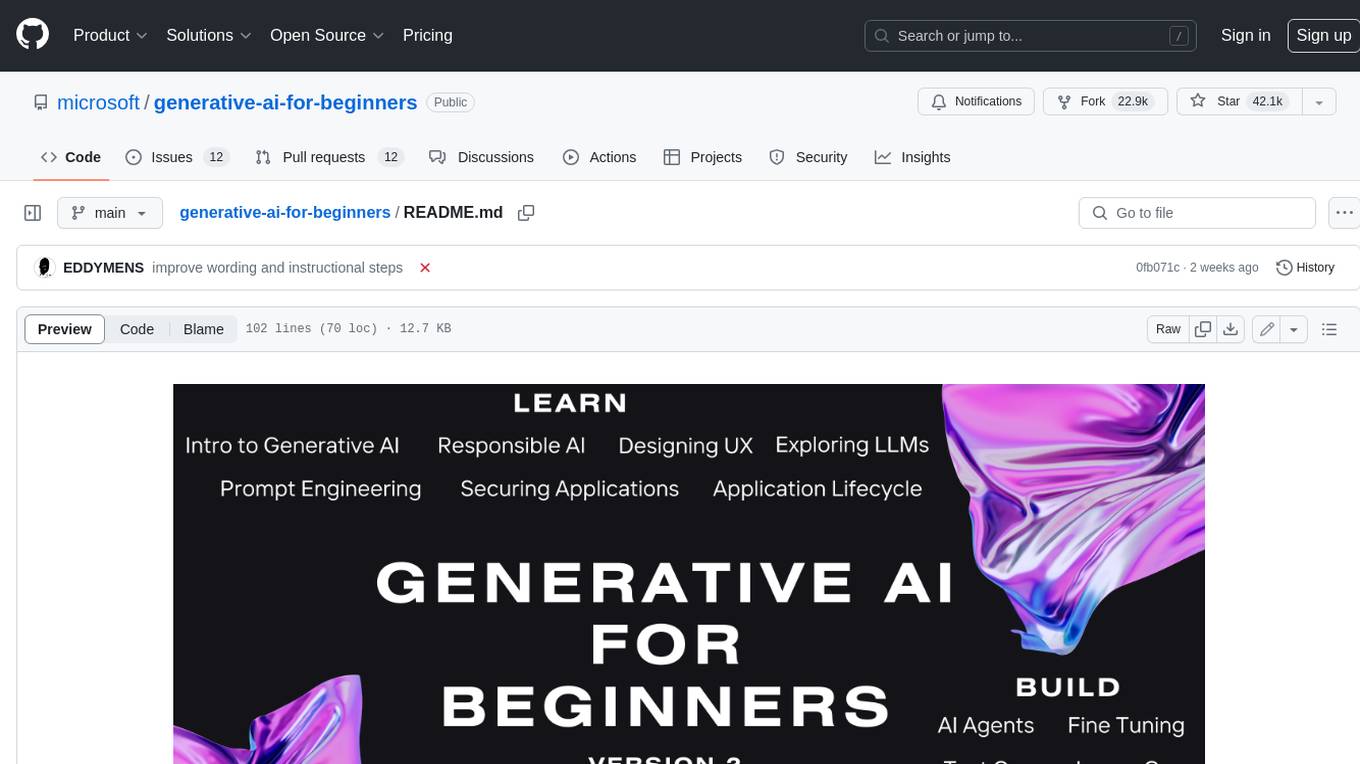
generative-ai-for-beginners
This course has 18 lessons. Each lesson covers its own topic so start wherever you like! Lessons are labeled either "Learn" lessons explaining a Generative AI concept or "Build" lessons that explain a concept and code examples in both **Python** and **TypeScript** when possible. Each lesson also includes a "Keep Learning" section with additional learning tools. **What You Need** * Access to the Azure OpenAI Service **OR** OpenAI API - _Only required to complete coding lessons_ * Basic knowledge of Python or Typescript is helpful - *For absolute beginners check out these Python and TypeScript courses. * A Github account to fork this entire repo to your own GitHub account We have created a **Course Setup** lesson to help you with setting up your development environment. Don't forget to star (🌟) this repo to find it easier later. ## 🧠 Ready to Deploy? If you are looking for more advanced code samples, check out our collection of Generative AI Code Samples in both **Python** and **TypeScript**. ## 🗣️ Meet Other Learners, Get Support Join our official AI Discord server to meet and network with other learners taking this course and get support. ## 🚀 Building a Startup? Sign up for Microsoft for Startups Founders Hub to receive **free OpenAI credits** and up to **$150k towards Azure credits to access OpenAI models through Azure OpenAI Services**. ## 🙏 Want to help? Do you have suggestions or found spelling or code errors? Raise an issue or Create a pull request ## 📂 Each lesson includes: * A short video introduction to the topic * A written lesson located in the README * Python and TypeScript code samples supporting Azure OpenAI and OpenAI API * Links to extra resources to continue your learning ## 🗃️ Lessons | | Lesson Link | Description | Additional Learning | | :-: | :------------------------------------------------------------------------------------------------------------------------------------------: | :---------------------------------------------------------------------------------------------: | ------------------------------------------------------------------------------ | | 00 | Course Setup | **Learn:** How to Setup Your Development Environment | Learn More | | 01 | Introduction to Generative AI and LLMs | **Learn:** Understanding what Generative AI is and how Large Language Models (LLMs) work. | Learn More | | 02 | Exploring and comparing different LLMs | **Learn:** How to select the right model for your use case | Learn More | | 03 | Using Generative AI Responsibly | **Learn:** How to build Generative AI Applications responsibly | Learn More | | 04 | Understanding Prompt Engineering Fundamentals | **Learn:** Hands-on Prompt Engineering Best Practices | Learn More | | 05 | Creating Advanced Prompts | **Learn:** How to apply prompt engineering techniques that improve the outcome of your prompts. | Learn More | | 06 | Building Text Generation Applications | **Build:** A text generation app using Azure OpenAI | Learn More | | 07 | Building Chat Applications | **Build:** Techniques for efficiently building and integrating chat applications. | Learn More | | 08 | Building Search Apps Vector Databases | **Build:** A search application that uses Embeddings to search for data. | Learn More | | 09 | Building Image Generation Applications | **Build:** A image generation application | Learn More | | 10 | Building Low Code AI Applications | **Build:** A Generative AI application using Low Code tools | Learn More | | 11 | Integrating External Applications with Function Calling | **Build:** What is function calling and its use cases for applications | Learn More | | 12 | Designing UX for AI Applications | **Learn:** How to apply UX design principles when developing Generative AI Applications | Learn More | | 13 | Securing Your Generative AI Applications | **Learn:** The threats and risks to AI systems and methods to secure these systems. | Learn More | | 14 | The Generative AI Application Lifecycle | **Learn:** The tools and metrics to manage the LLM Lifecycle and LLMOps | Learn More | | 15 | Retrieval Augmented Generation (RAG) and Vector Databases | **Build:** An application using a RAG Framework to retrieve embeddings from a Vector Databases | Learn More | | 16 | Open Source Models and Hugging Face | **Build:** An application using open source models available on Hugging Face | Learn More | | 17 | AI Agents | **Build:** An application using an AI Agent Framework | Learn More | | 18 | Fine-Tuning LLMs | **Learn:** The what, why and how of fine-tuning LLMs | Learn More |
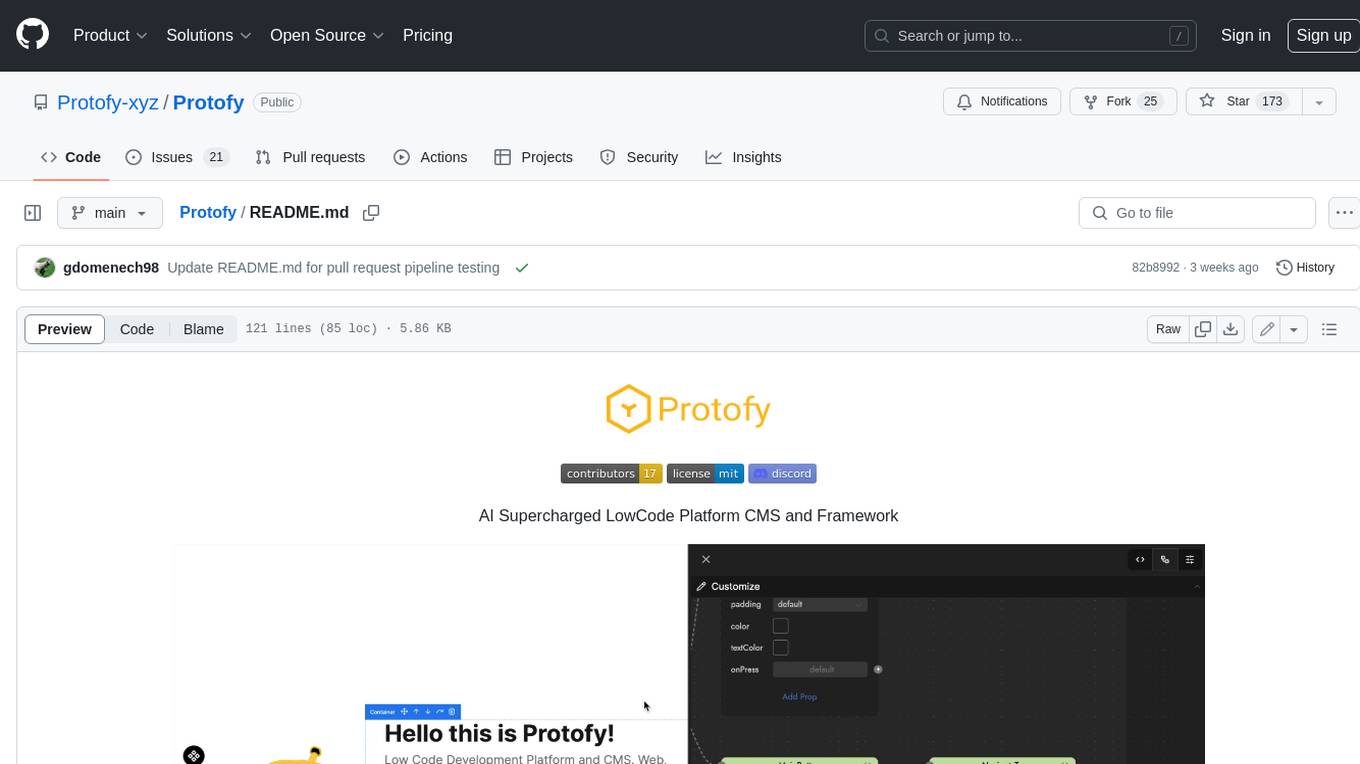
Protofy
Protofy is a full-stack, batteries-included low-code enabled web/app and IoT system with an API system and real-time messaging. It is based on Protofy (protoflow + visualui + protolib + protodevices) + Expo + Next.js + Tamagui + Solito + Express + Aedes + Redbird + Many other amazing packages. Protofy can be used to fast prototype Apps, webs, IoT systems, automations, or APIs. It is a ultra-extensible CMS with supercharged capabilities, mobile support, and IoT support (esp32 thanks to esphome).
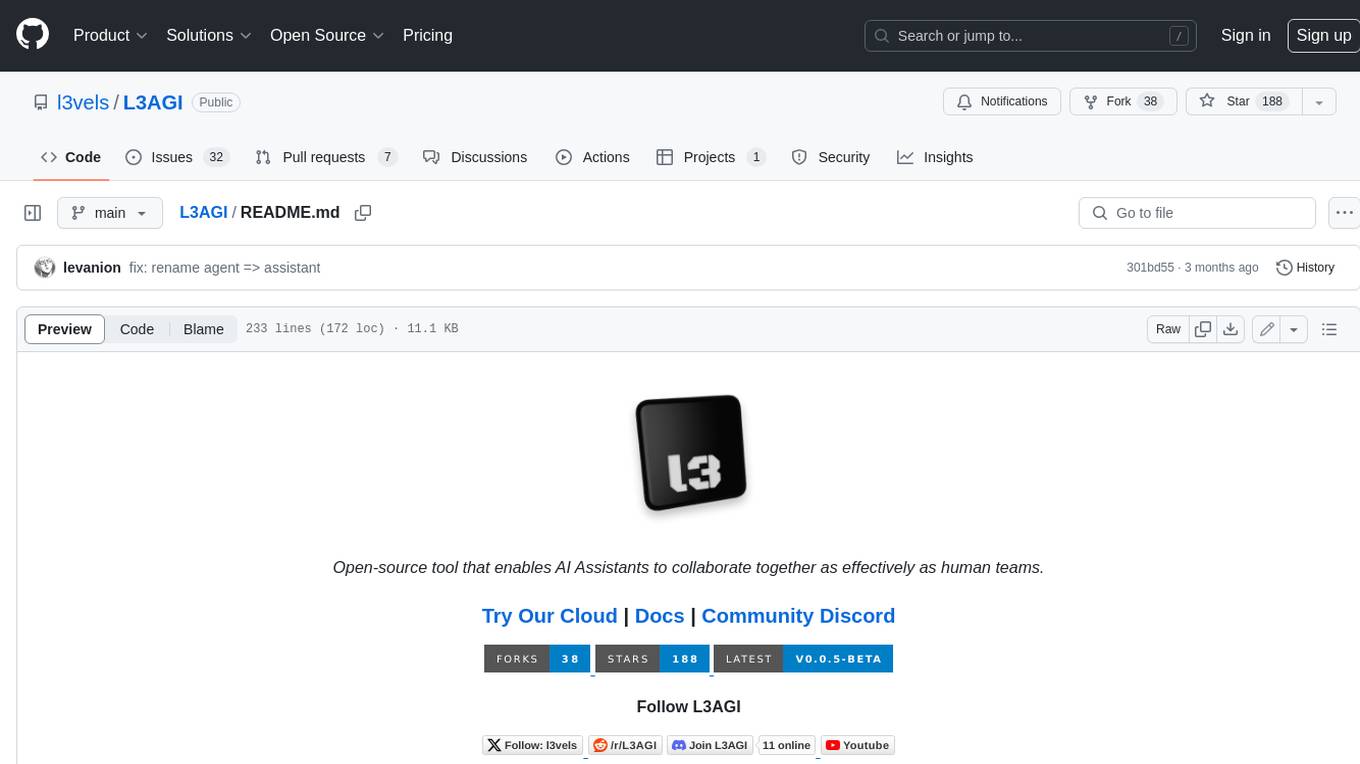
L3AGI
L3AGI is an open-source tool that enables AI Assistants to collaborate together as effectively as human teams. It provides a robust set of functionalities that empower users to design, supervise, and execute both autonomous AI Assistants and Teams of Assistants. Key features include the ability to create and manage Teams of AI Assistants, design and oversee standalone AI Assistants, equip AI Assistants with the ability to retain and recall information, connect AI Assistants to an array of data sources for efficient information retrieval and processing, and employ curated sets of tools for specific tasks. L3AGI also offers a user-friendly interface, APIs for integration with other systems, and a vibrant community for support and collaboration.
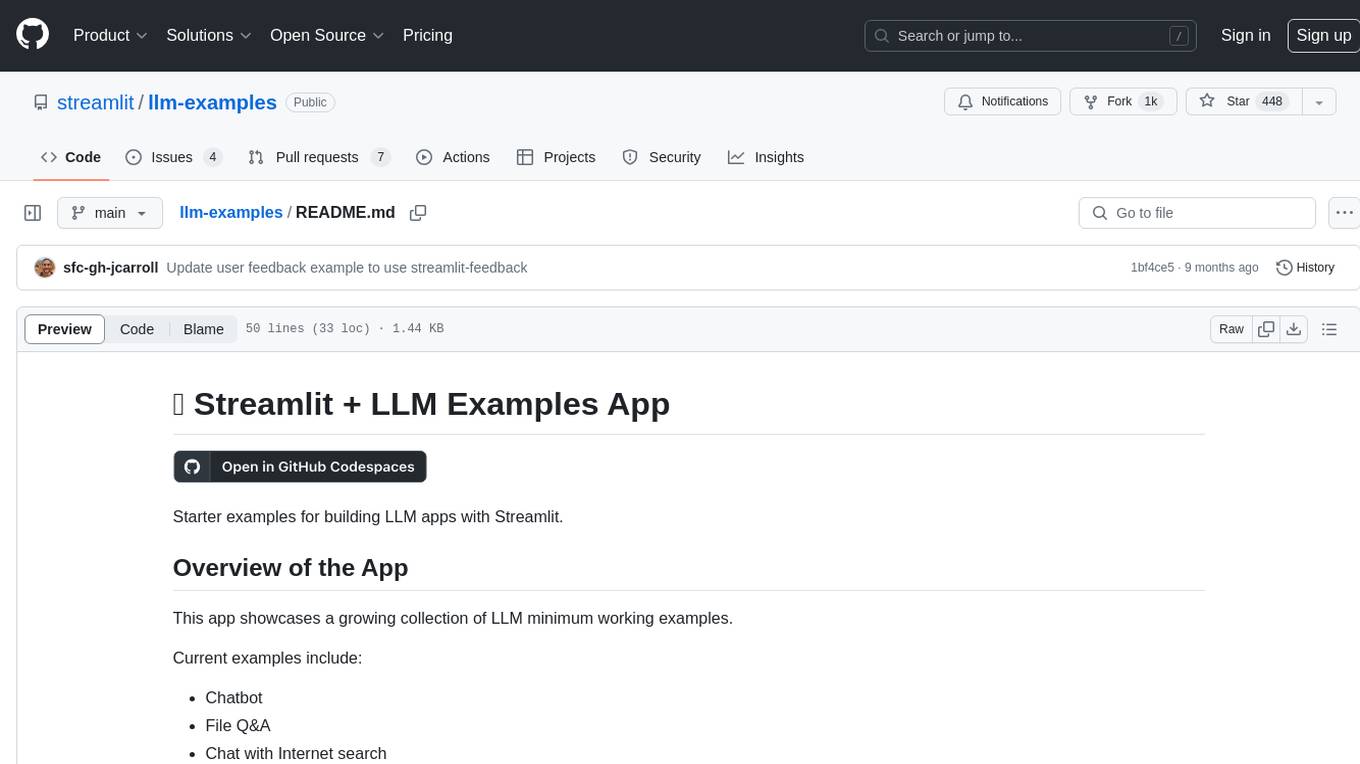
llm-examples
Starter examples for building LLM apps with Streamlit. This repository showcases a growing collection of LLM minimum working examples, including a Chatbot, File Q&A, Chat with Internet search, LangChain Quickstart, LangChain PromptTemplate, and Chat with user feedback. Users can easily get their own OpenAI API key and set it as an environment variable in Streamlit apps to run the examples locally.
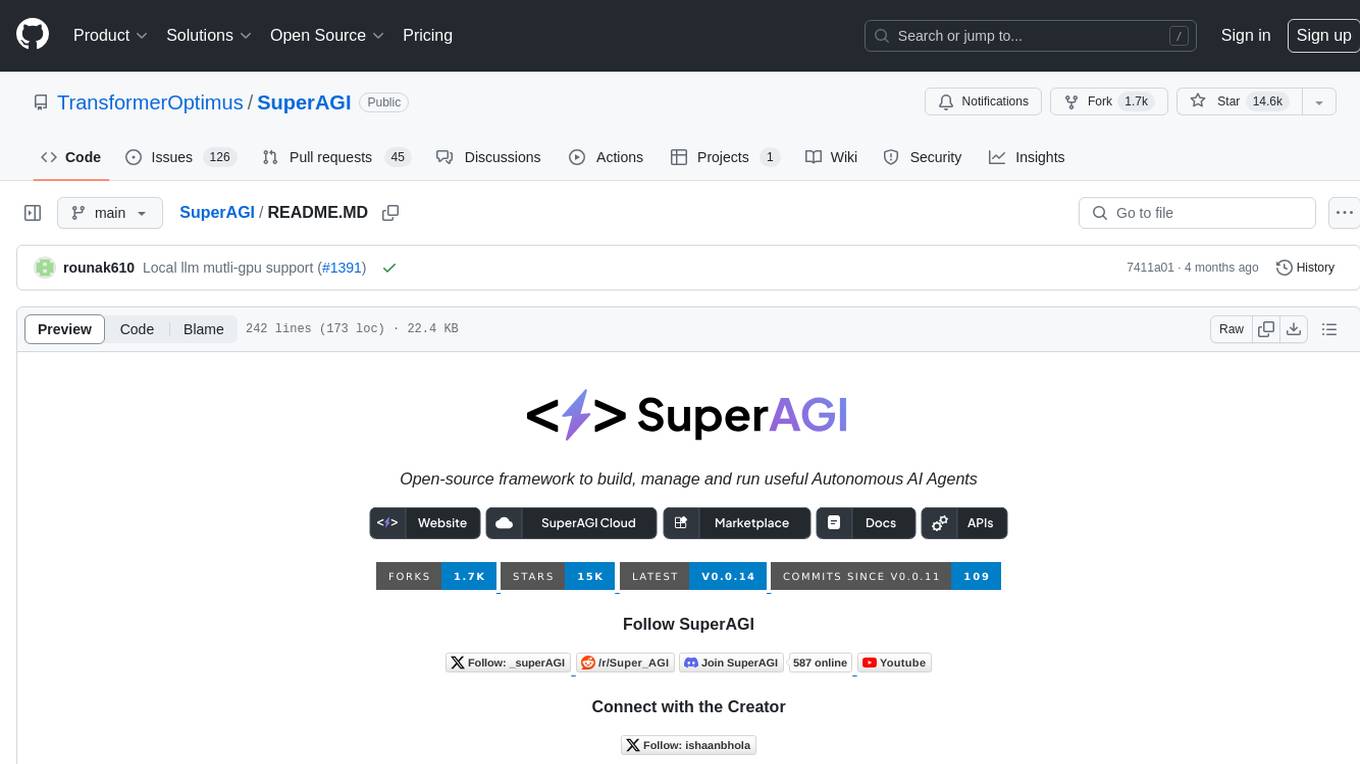
SuperAGI
SuperAGI is an open-source framework designed to build, manage, and run autonomous AI agents. It enables developers to create production-ready and scalable agents, extend agent capabilities with toolkits, and interact with agents through a graphical user interface. The framework allows users to connect to multiple Vector DBs, optimize token usage, store agent memory, utilize custom fine-tuned models, and automate tasks with predefined steps. SuperAGI also provides a marketplace for toolkits that enable agents to interact with external systems and third-party plugins.
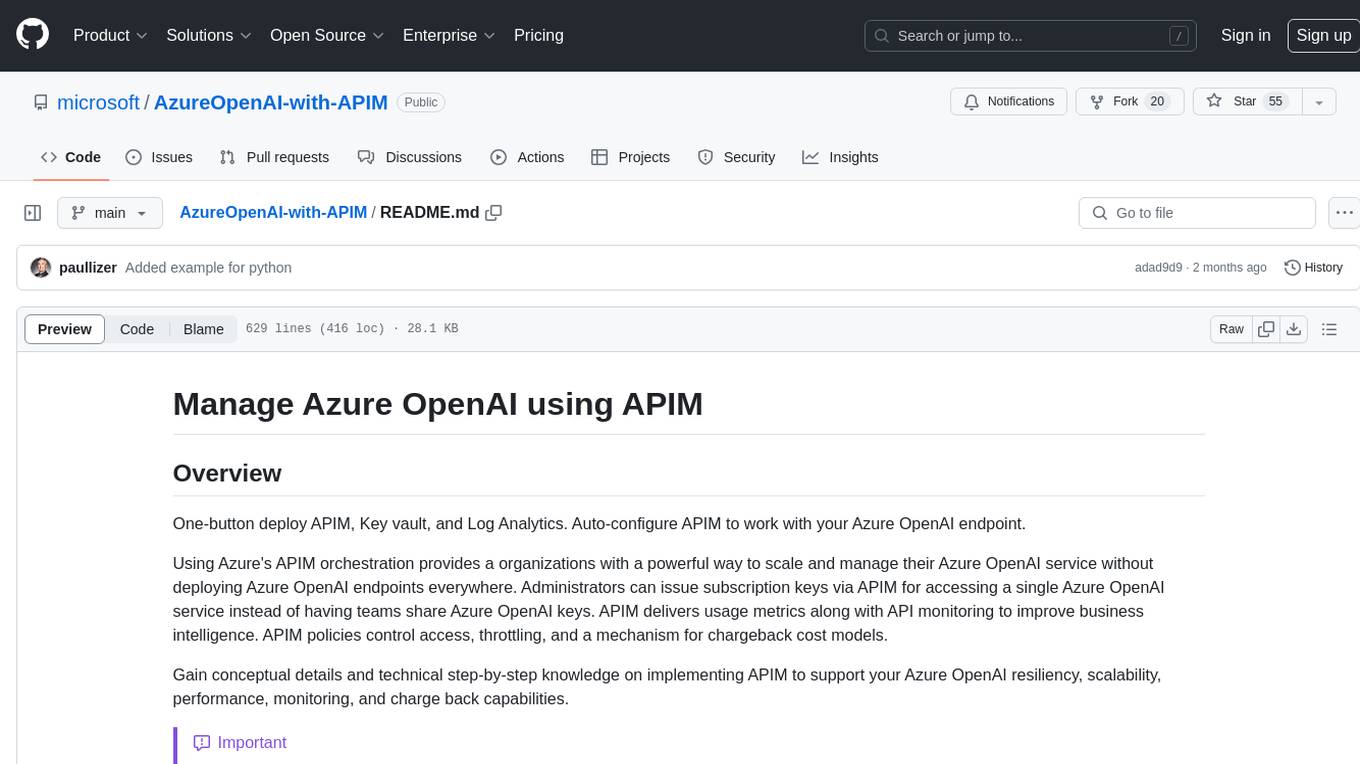
AzureOpenAI-with-APIM
AzureOpenAI-with-APIM is a repository that provides a one-button deploy solution for Azure API Management (APIM), Key Vault, and Log Analytics to work seamlessly with Azure OpenAI endpoints. It enables organizations to scale and manage their Azure OpenAI service efficiently by issuing subscription keys via APIM, delivering usage metrics, and implementing policies for access control and cost management. The repository offers detailed guidance on implementing APIM to enhance Azure OpenAI resiliency, scalability, performance, monitoring, and chargeback capabilities.
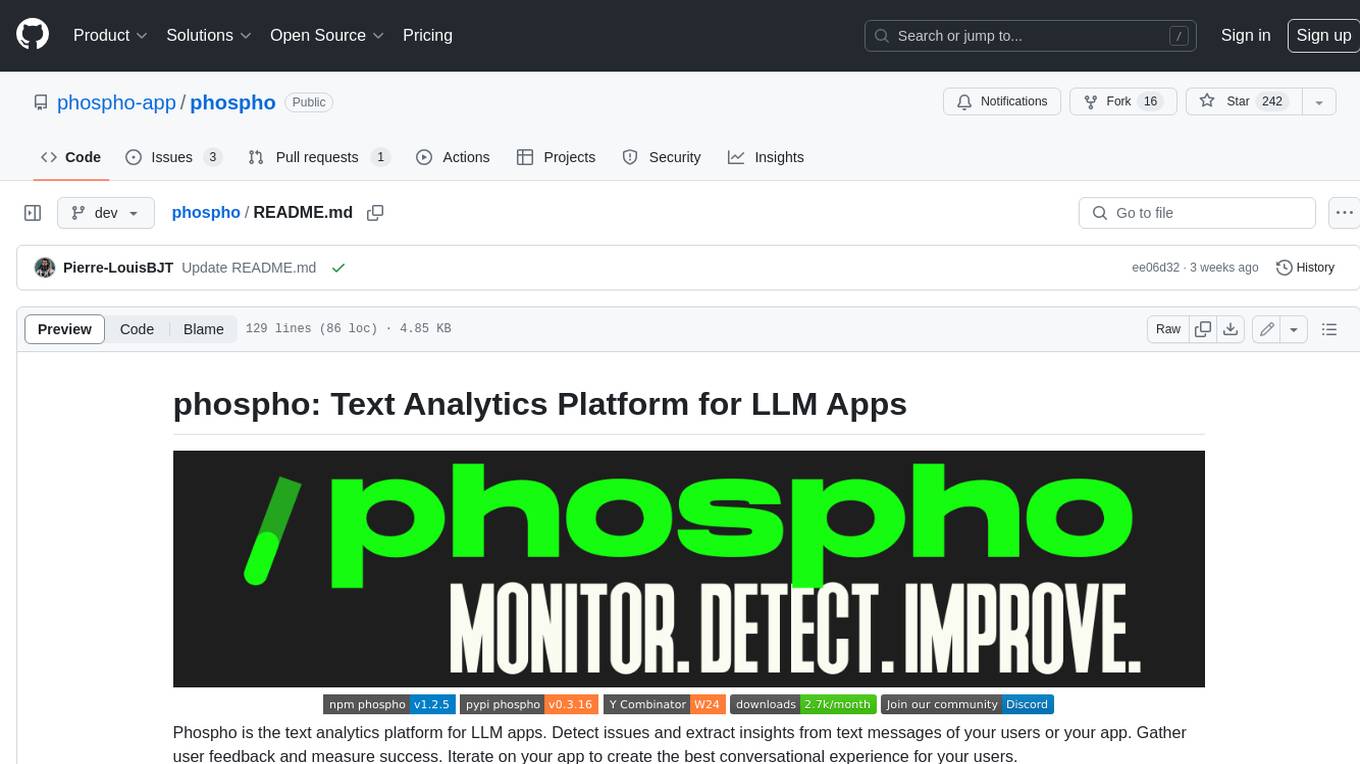
phospho
Phospho is a text analytics platform for LLM apps. It helps you detect issues and extract insights from text messages of your users or your app. You can gather user feedback, measure success, and iterate on your app to create the best conversational experience for your users.
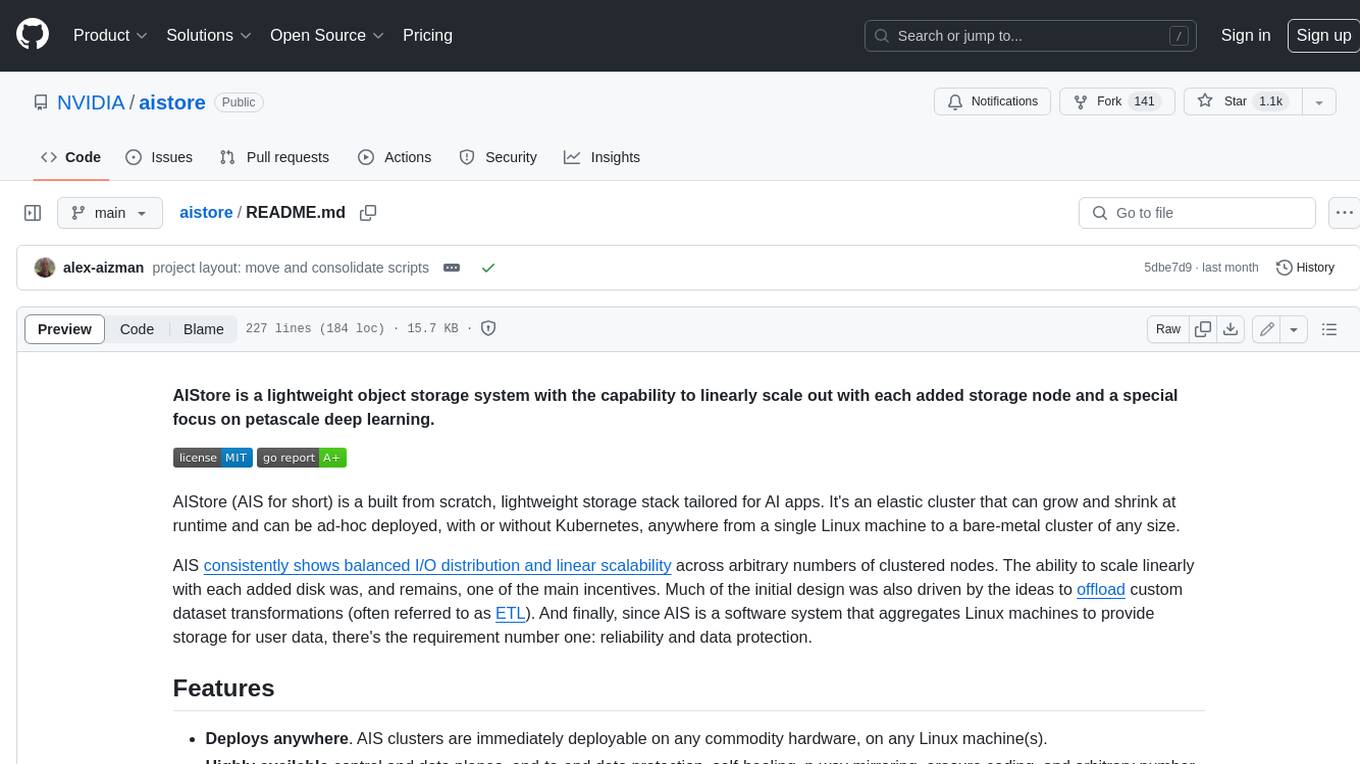
aistore
AIStore is a lightweight object storage system designed for AI applications. It is highly scalable, reliable, and easy to use. AIStore can be deployed on any commodity hardware, and it can be used to store and manage large datasets for deep learning and other AI applications.
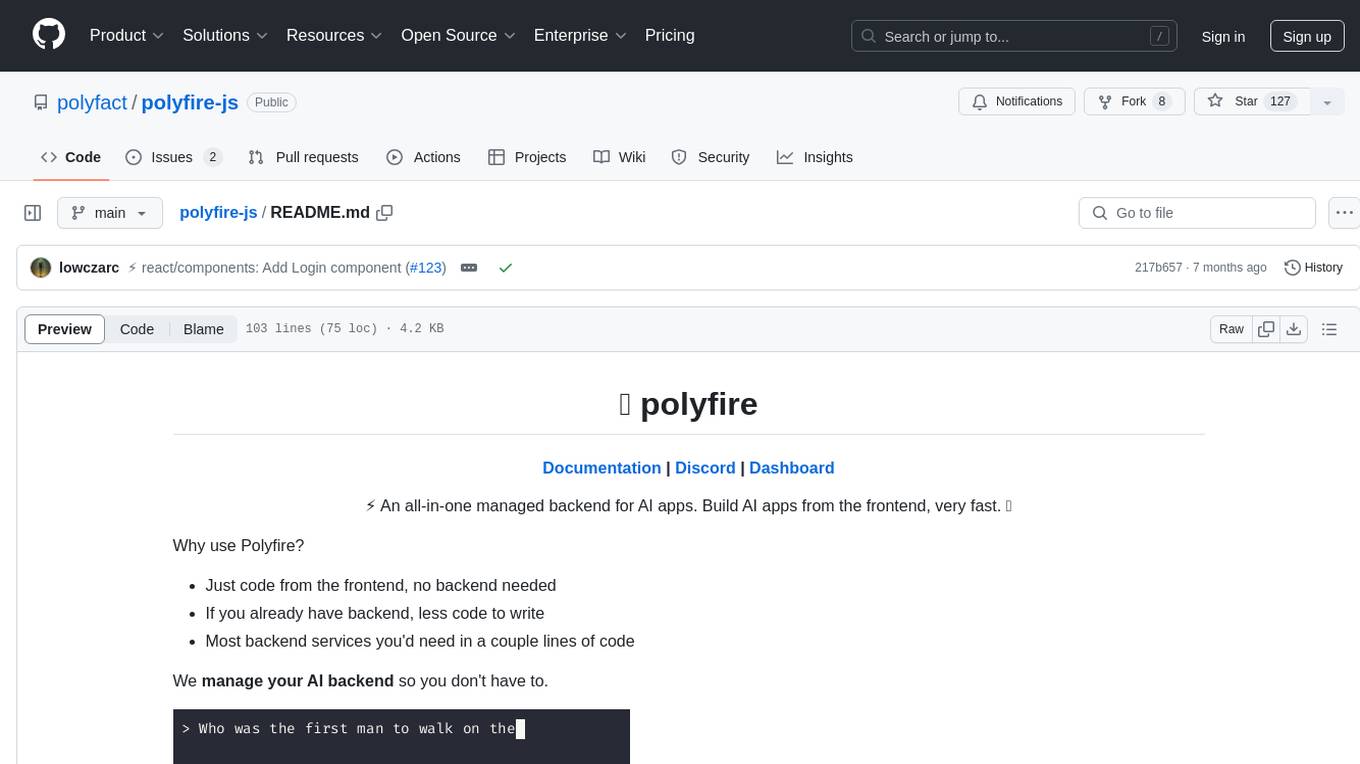
polyfire-js
Polyfire is an all-in-one managed backend for AI apps that allows users to build AI apps directly from the frontend, eliminating the need for a separate backend. It simplifies the process by providing most backend services in just a few lines of code. With Polyfire, users can easily create chatbots, transcribe audio files to text, generate simple text, create a long-term memory, and generate images with Dall-E. The tool also offers starter guides and tutorials to help users get started quickly and efficiently.
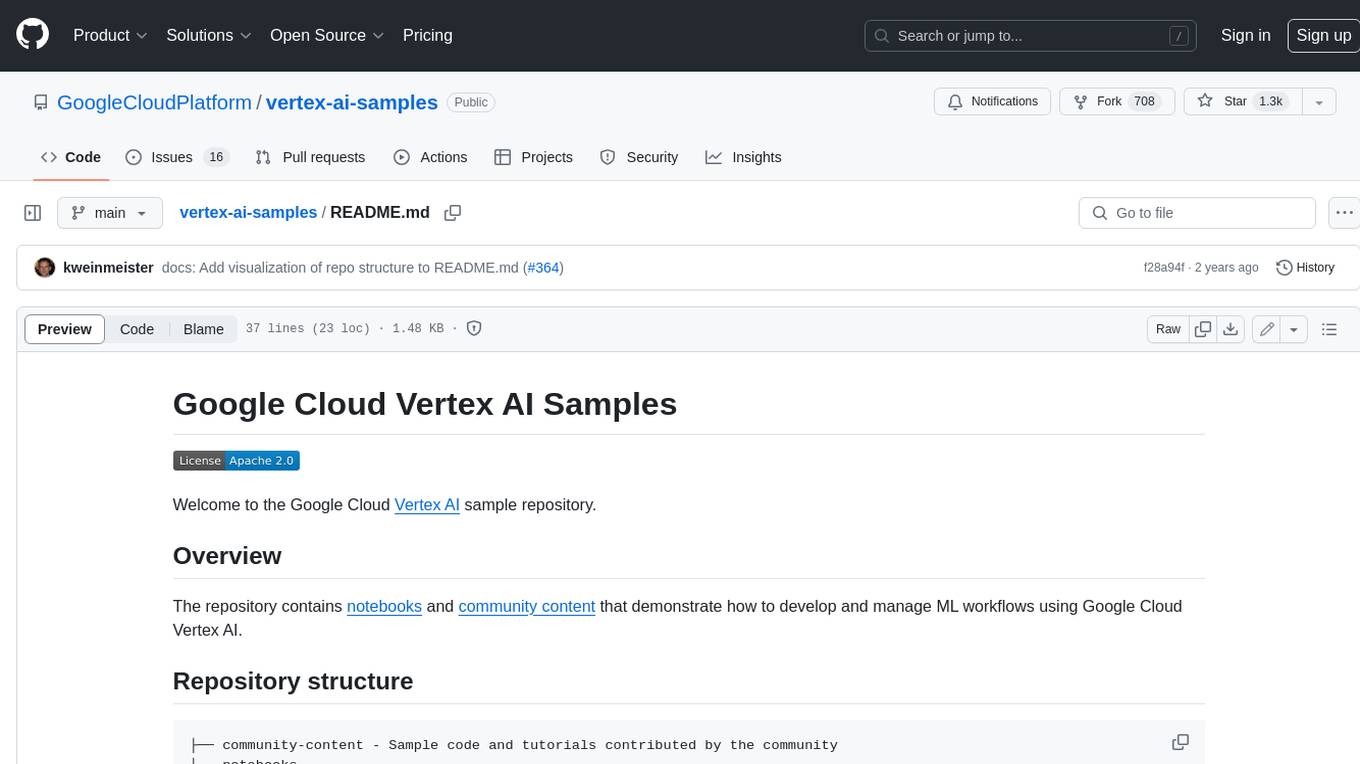
vertex-ai-samples
The Google Cloud Vertex AI sample repository contains notebooks and community content that demonstrate how to develop and manage ML workflows using Google Cloud Vertex AI.
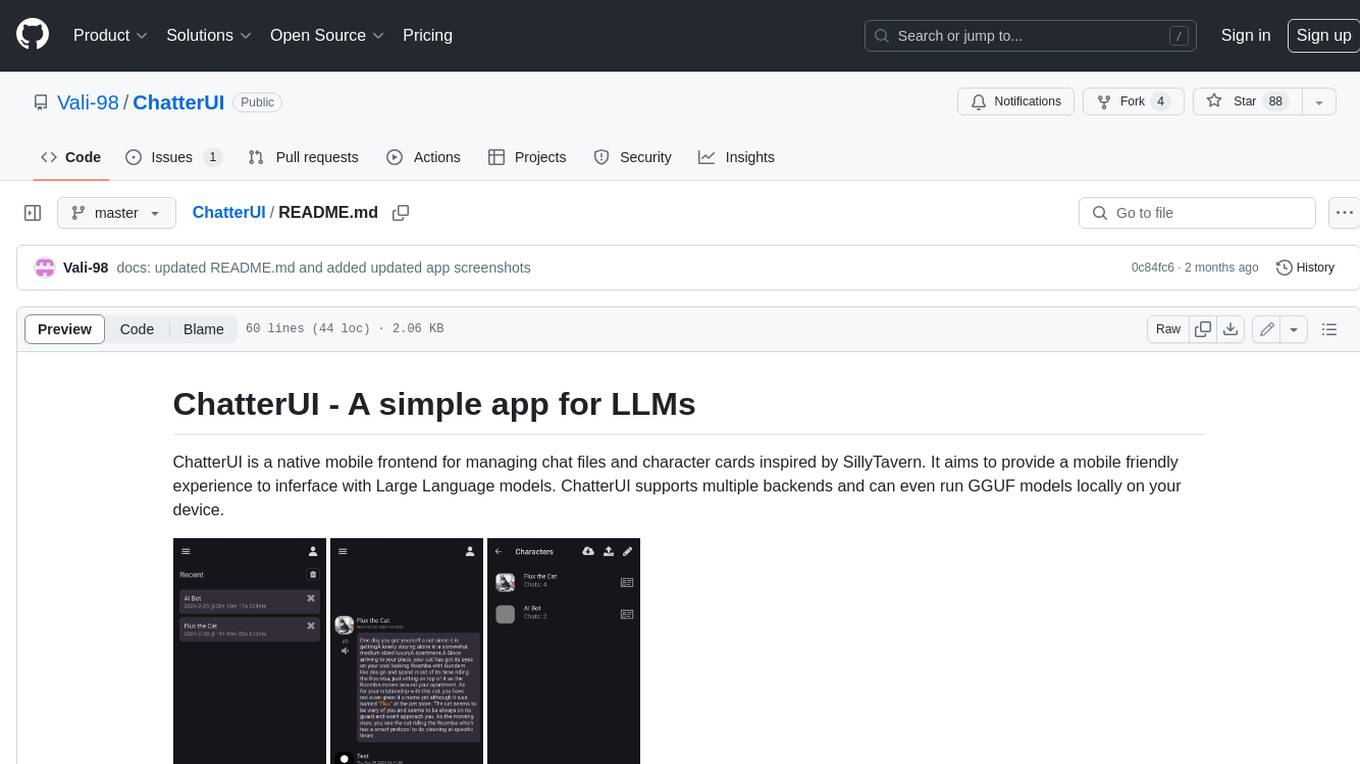
ChatterUI
ChatterUI is a mobile app that allows users to manage chat files and character cards, and to interact with Large Language Models (LLMs). It supports multiple backends, including local, koboldcpp, text-generation-webui, Generic Text Completions, AI Horde, Mancer, Open Router, and OpenAI. ChatterUI provides a mobile-friendly interface for interacting with LLMs, making it easy to use them for a variety of tasks, such as generating text, translating languages, writing code, and answering questions.
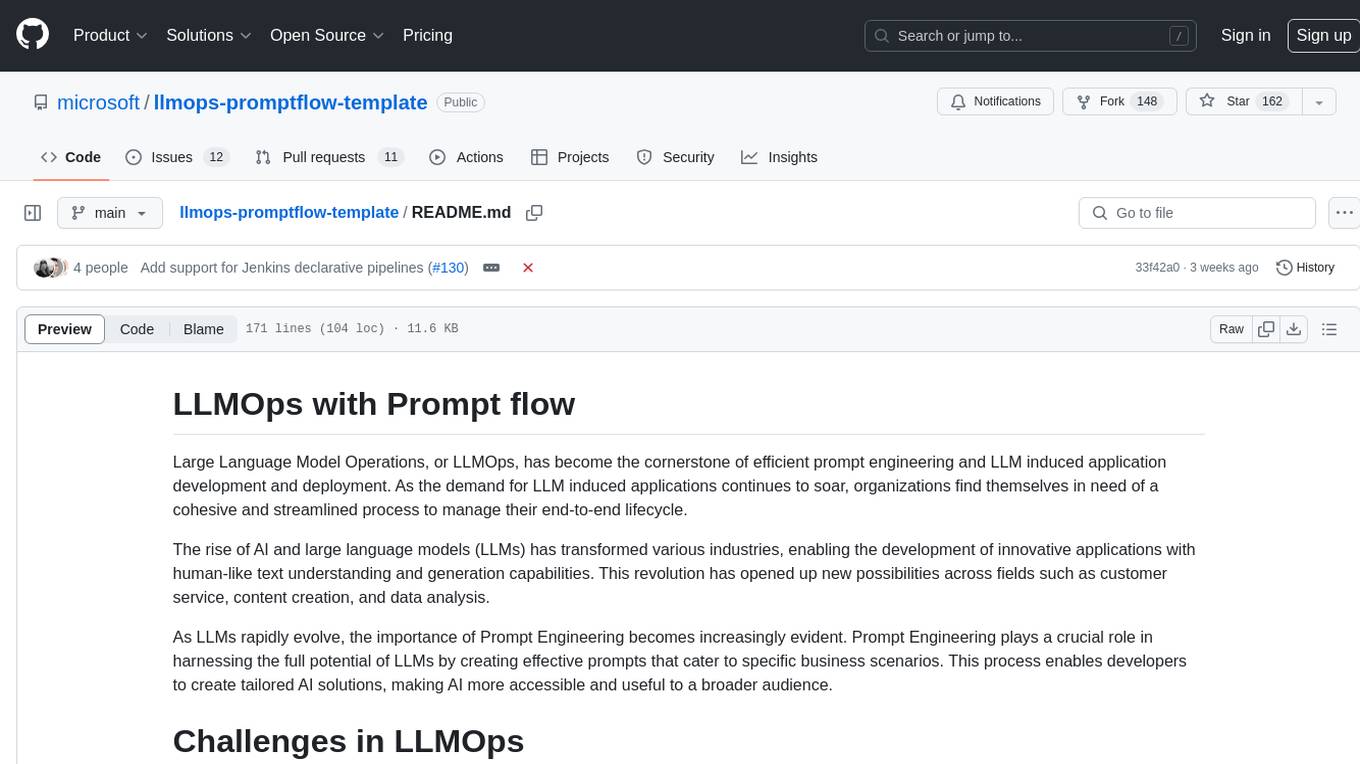
llmops-promptflow-template
LLMOps with Prompt flow is a template and guidance for building LLM-infused apps using Prompt flow. It provides centralized code hosting, lifecycle management, variant and hyperparameter experimentation, A/B deployment, many-to-many dataset/flow relationships, multiple deployment targets, comprehensive reporting, BYOF capabilities, configuration-based development, local prompt experimentation and evaluation, endpoint testing, and optional Human-in-loop validation. The tool is customizable to suit various application needs.
20 - OpenAI Gpts
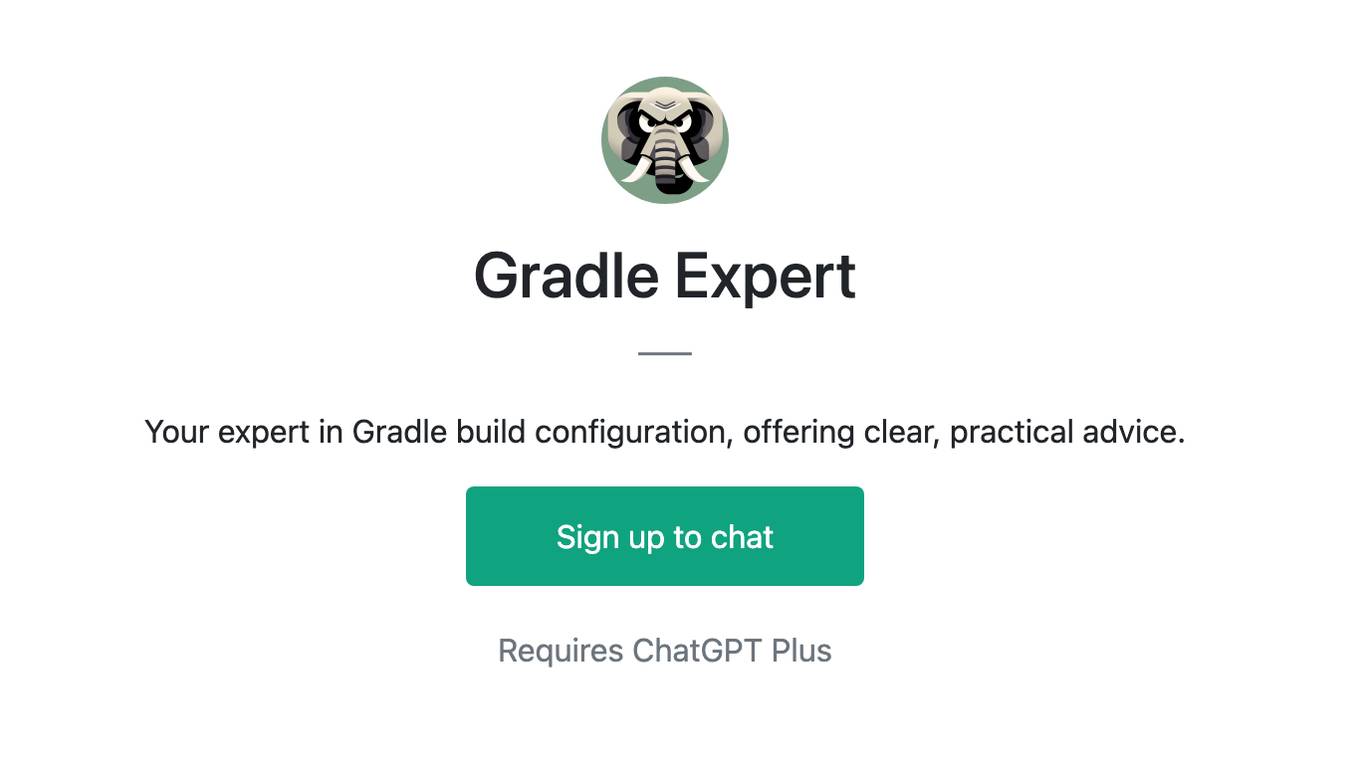
Gradle Expert
Your expert in Gradle build configuration, offering clear, practical advice.
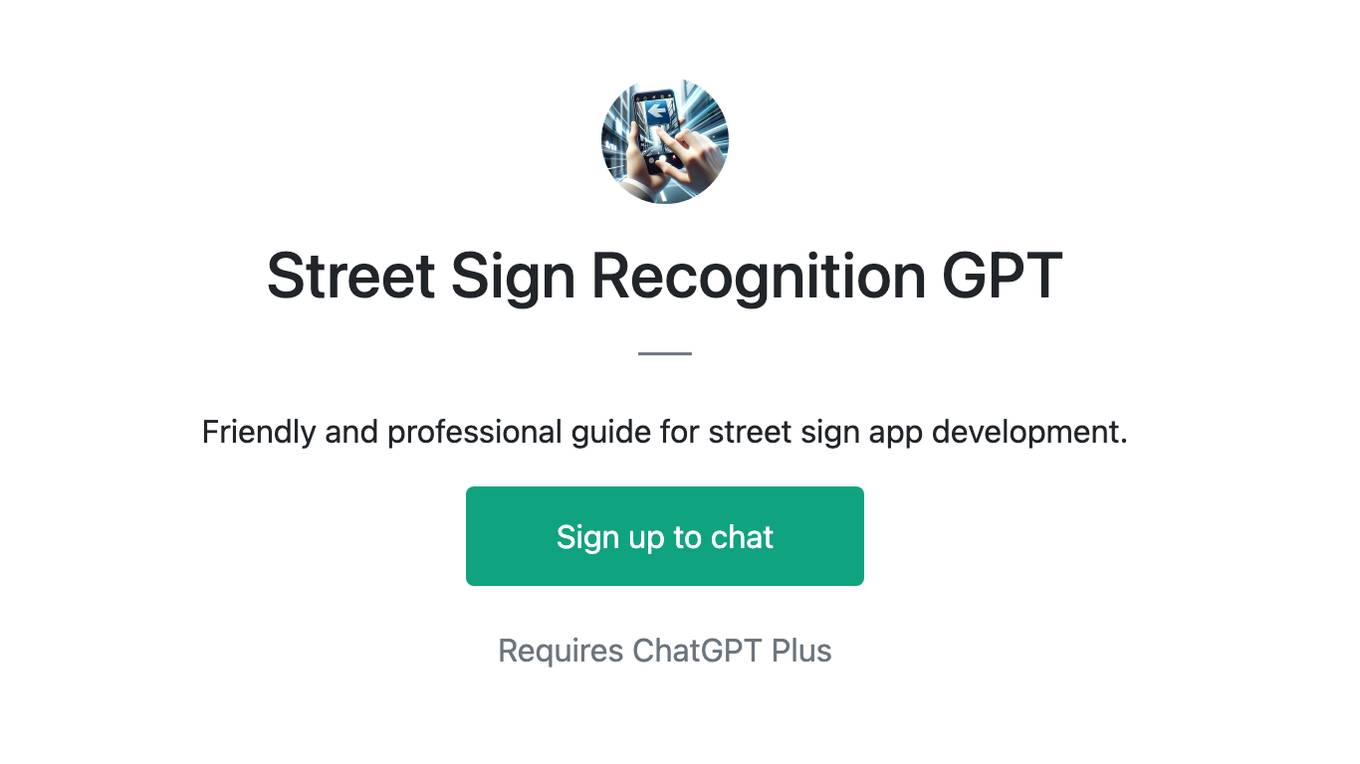
Street Sign Recognition GPT
Friendly and professional guide for street sign app development.
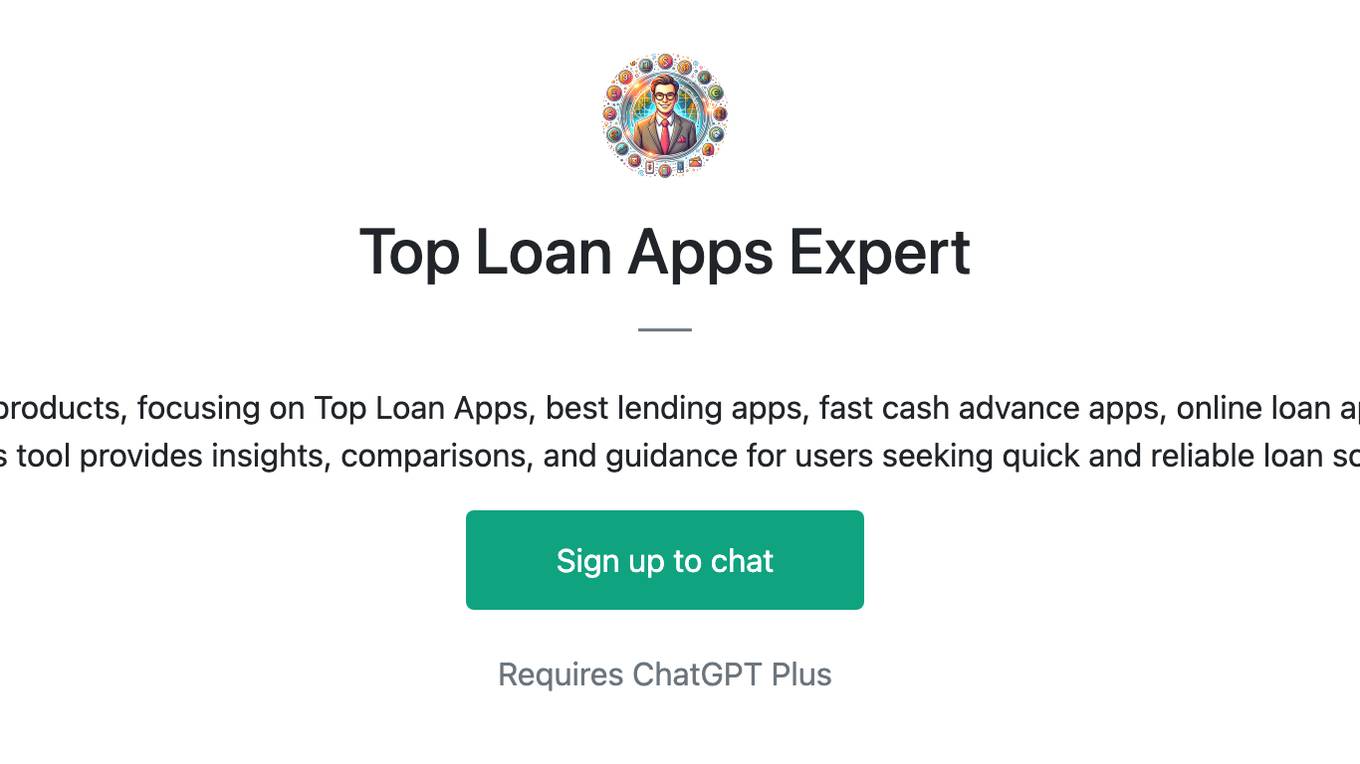
Top Loan Apps Expert
An AI tool offering expert advice on financial products, focusing on Top Loan Apps, best lending apps, fast cash advance apps, online loan apps, instant loan apps, and emergency loan apps. This tool provides insights, comparisons, and guidance for users seeking quick and reliable loan solutions.
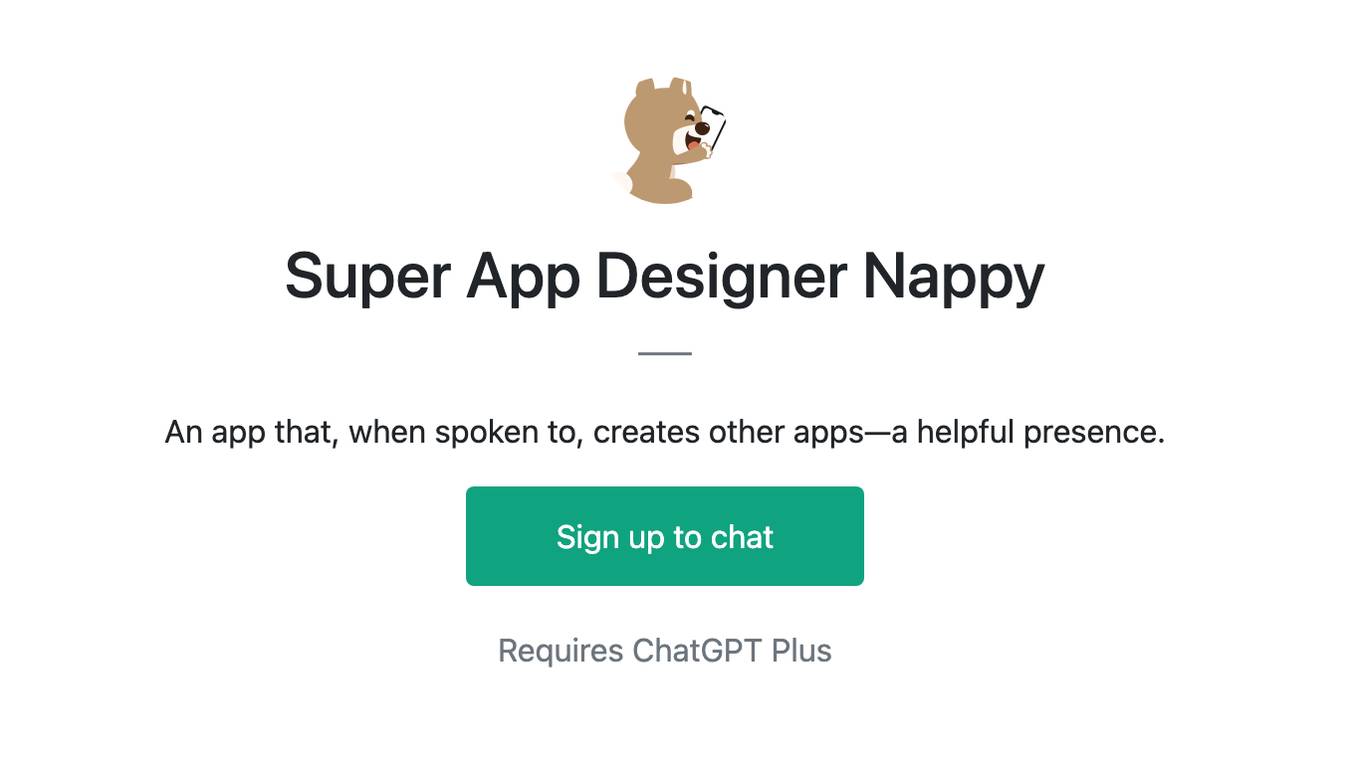
Super App Designer Nappy
An app that, when spoken to, creates other apps—a helpful presence.
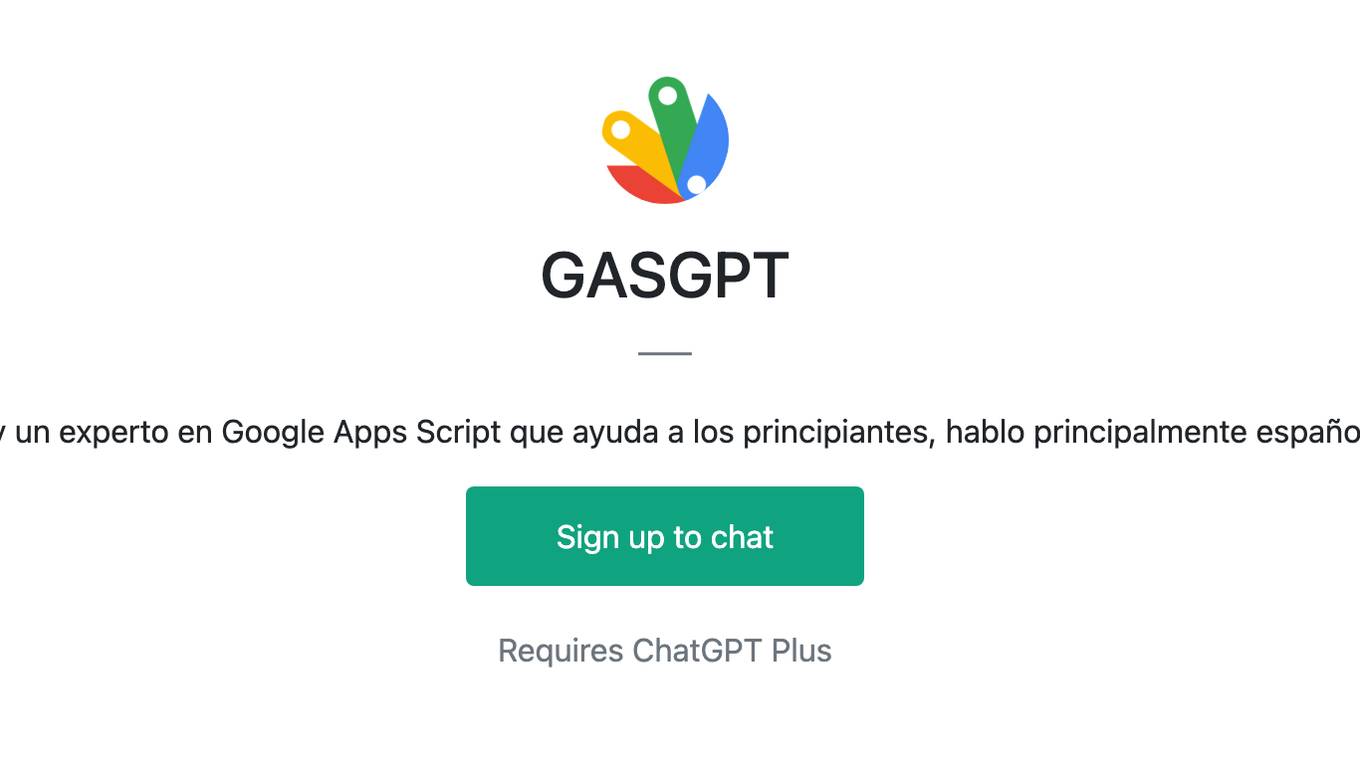
GASGPT
Soy un experto en Google Apps Script que ayuda a los principiantes, hablo principalmente español.
